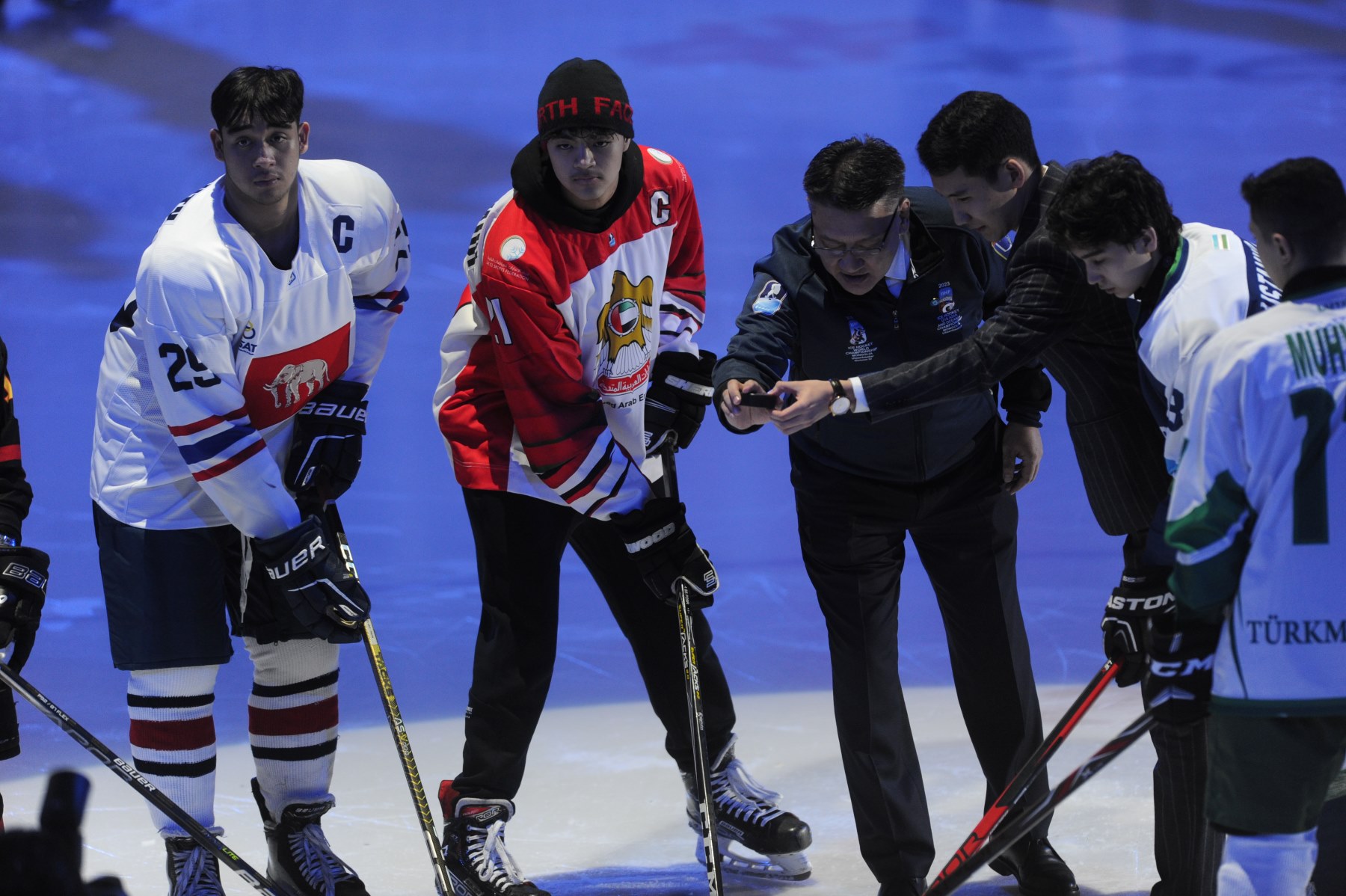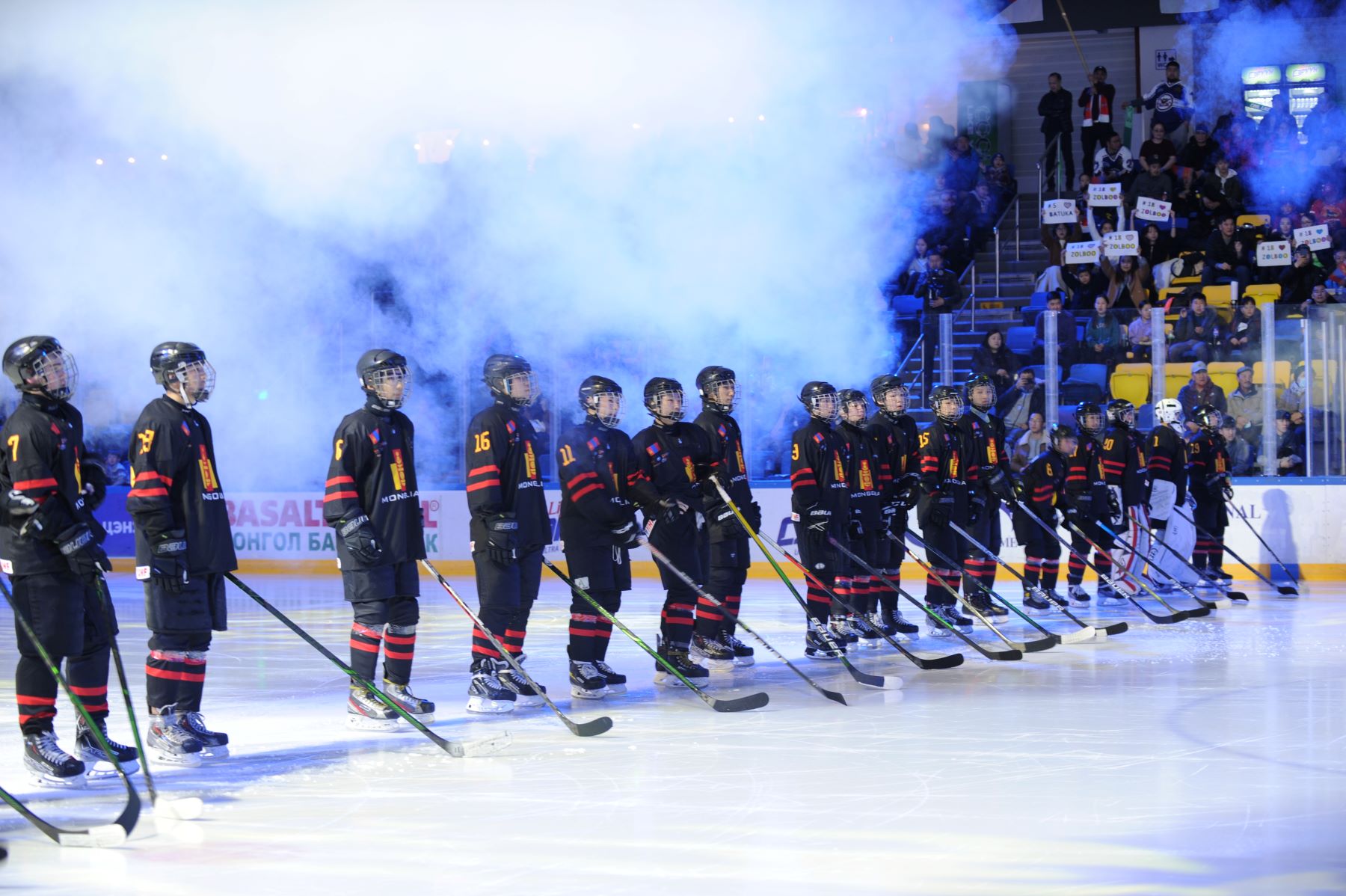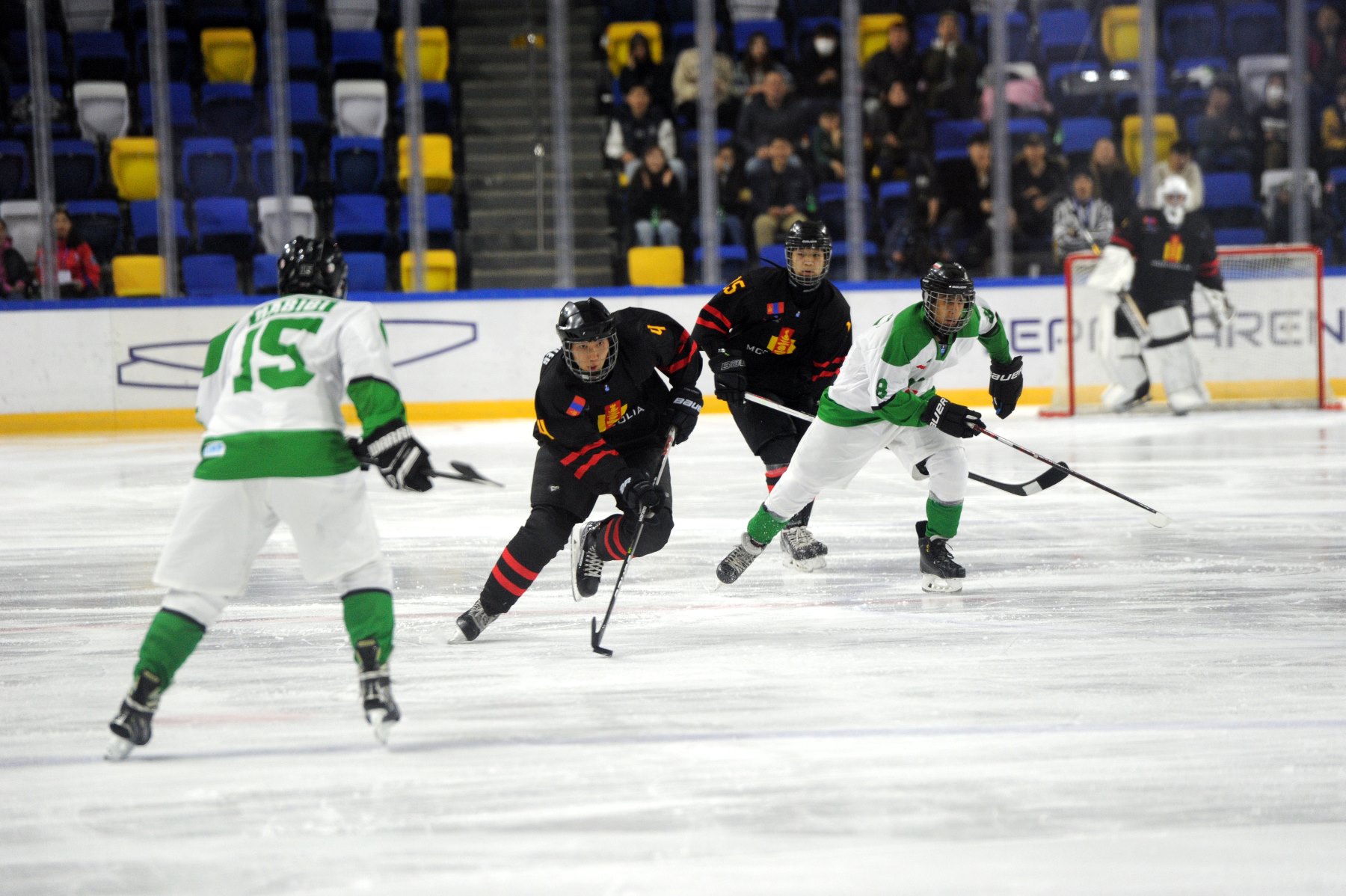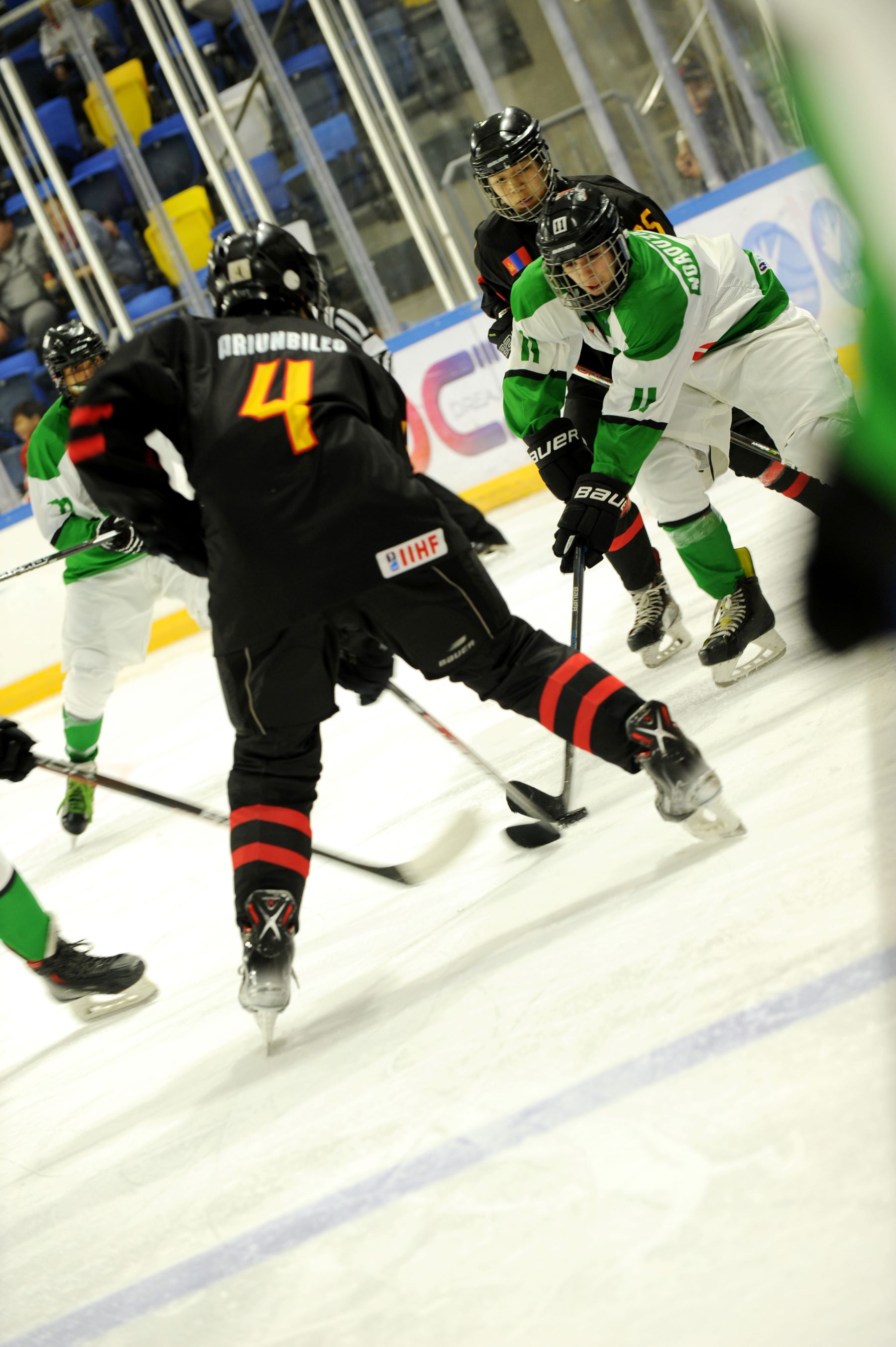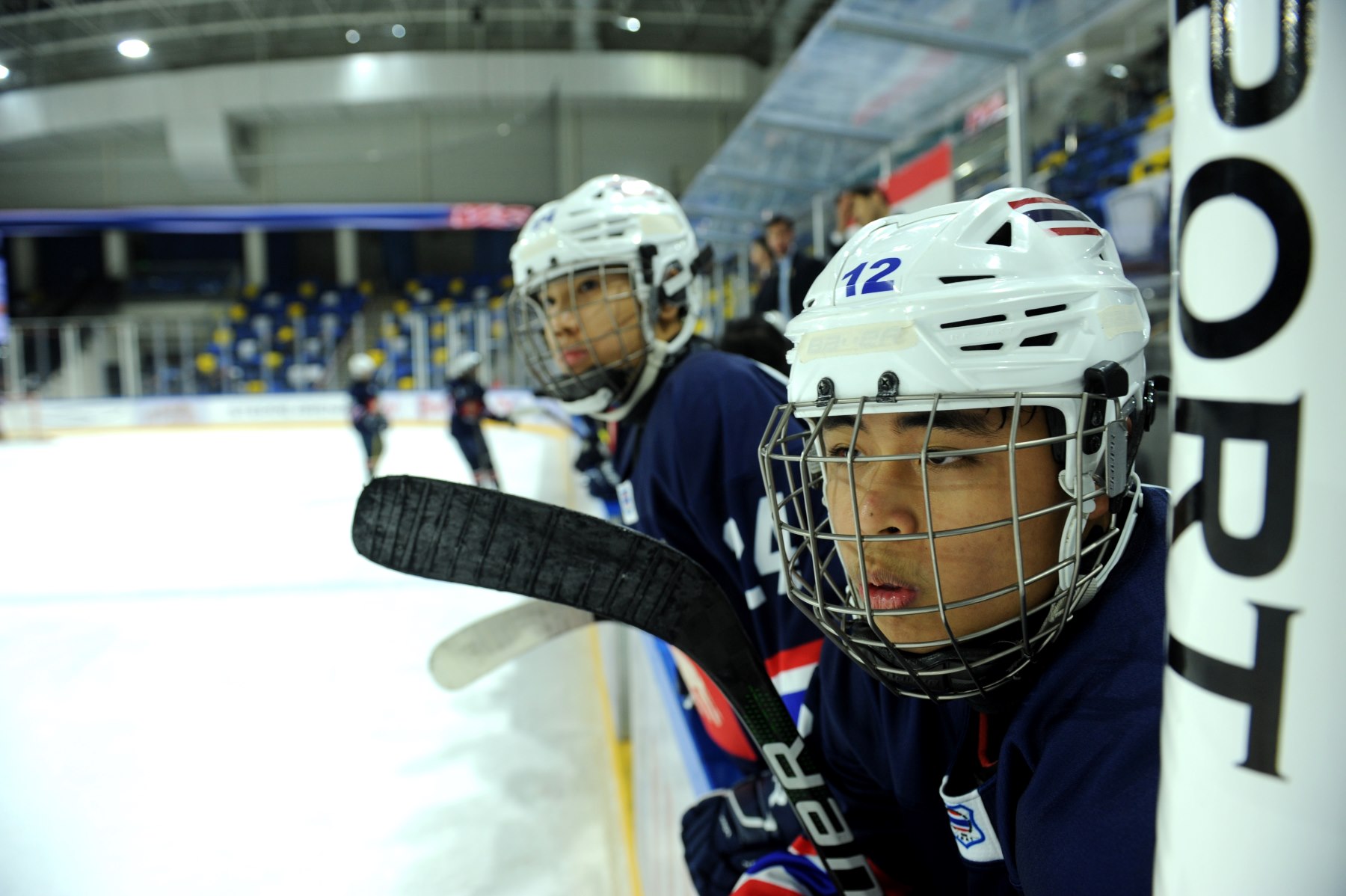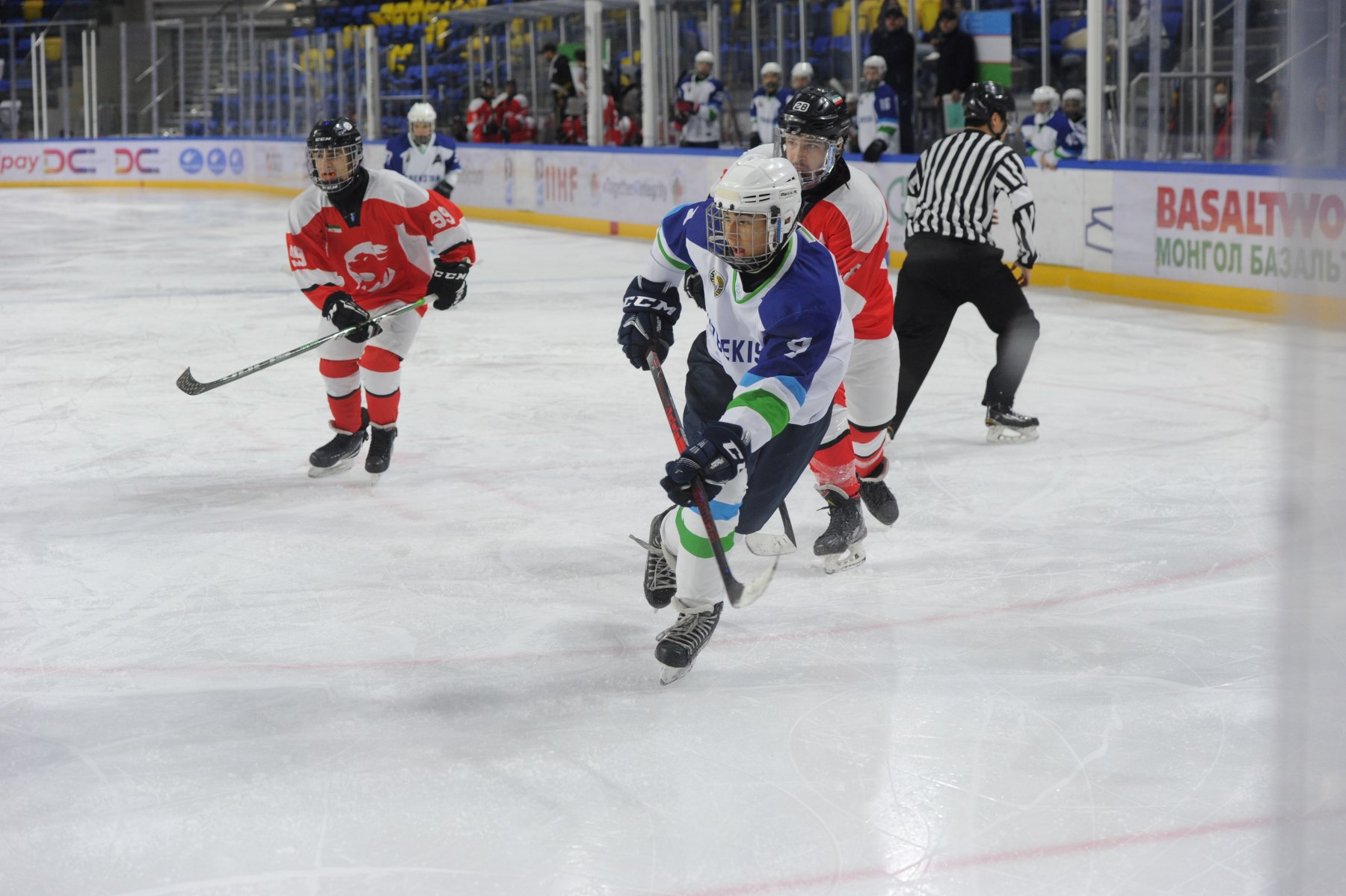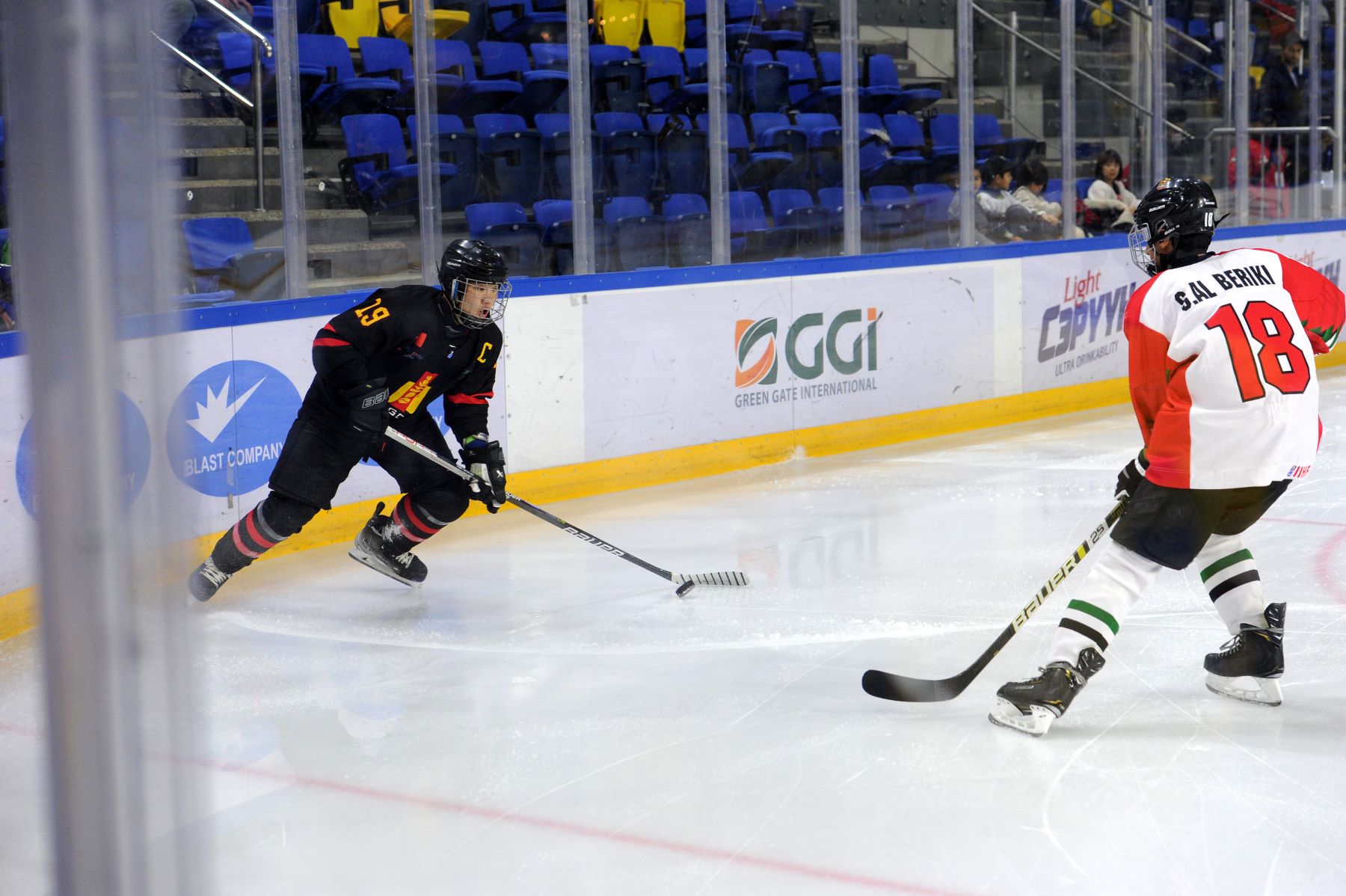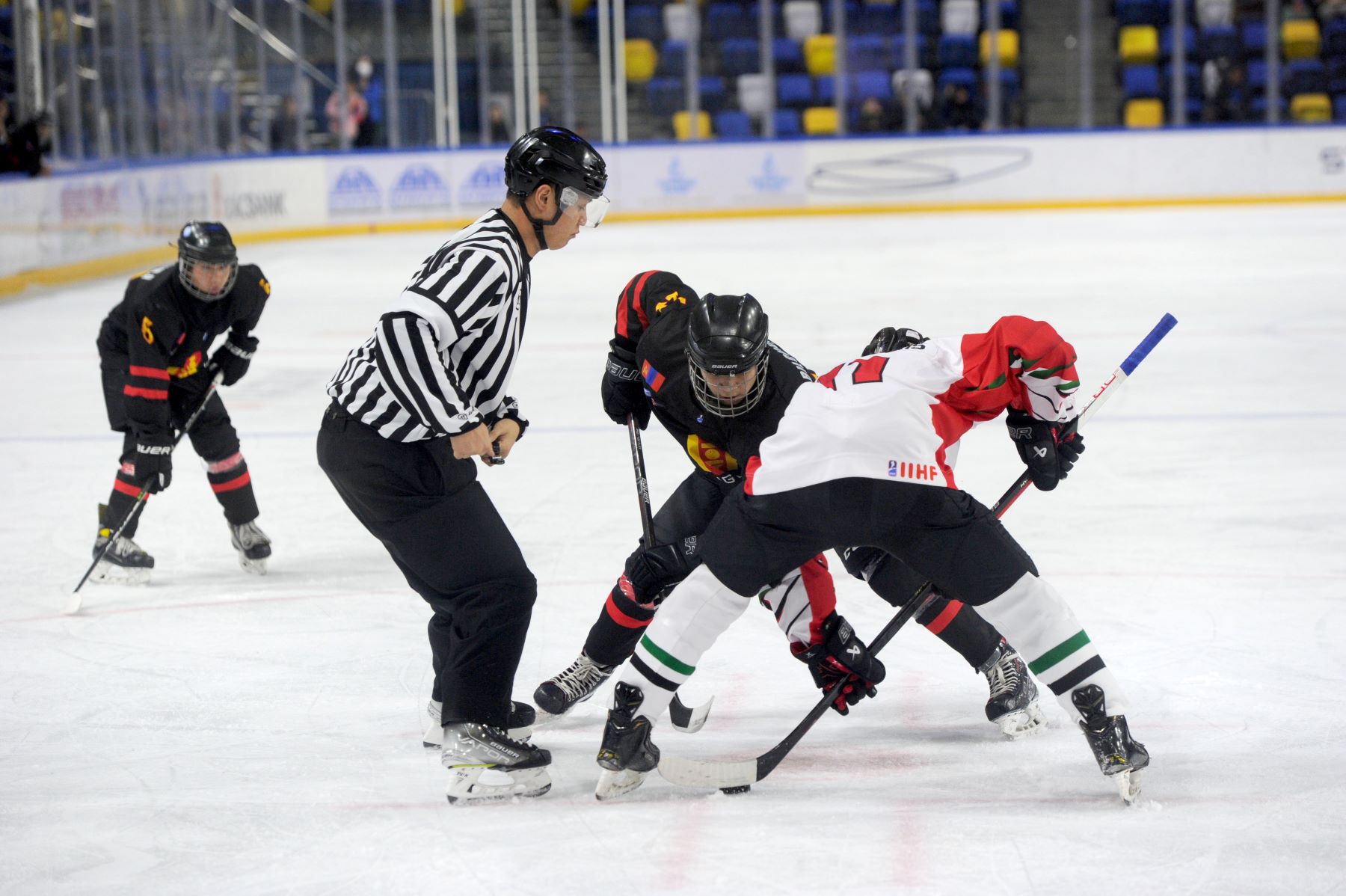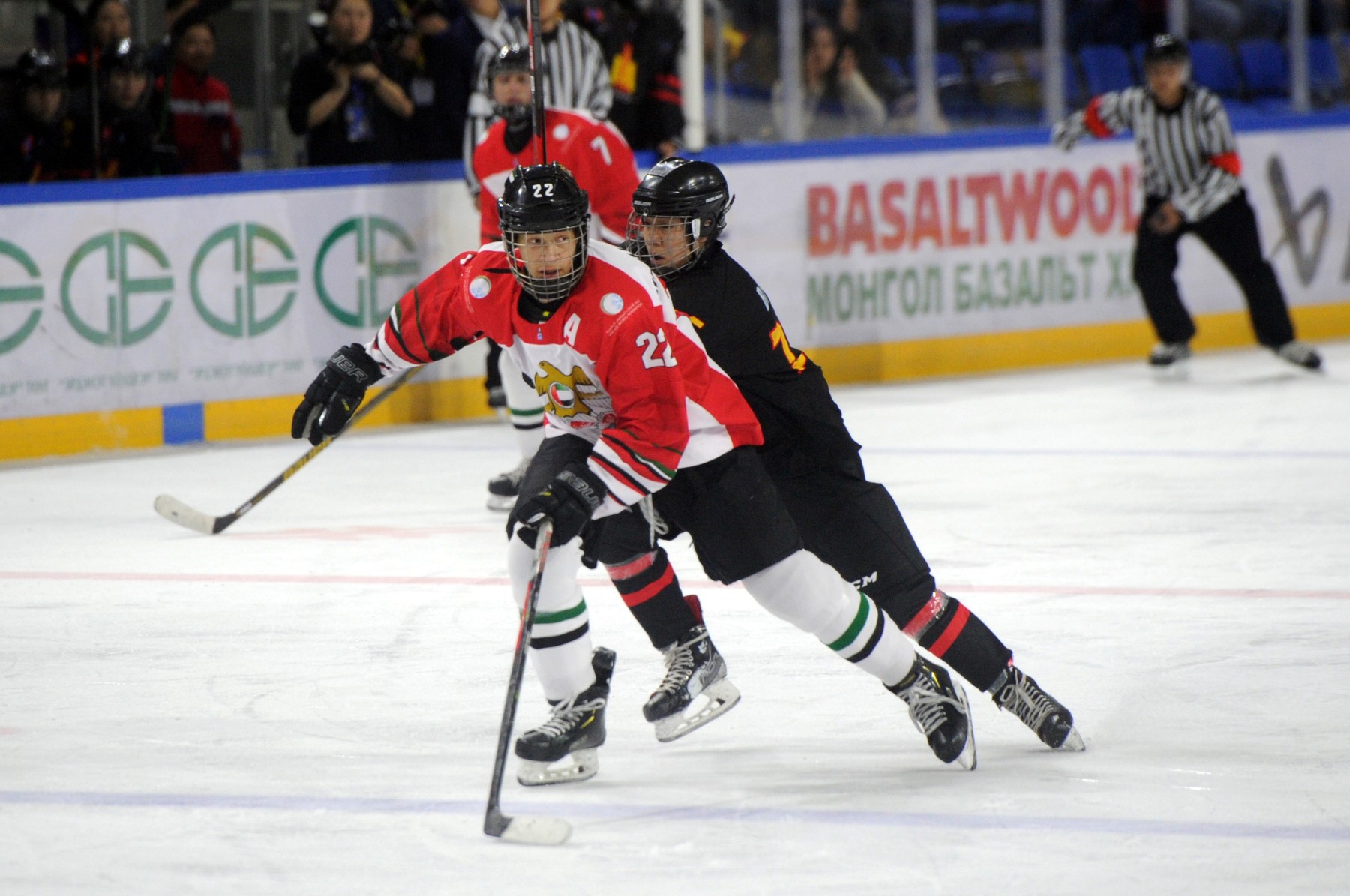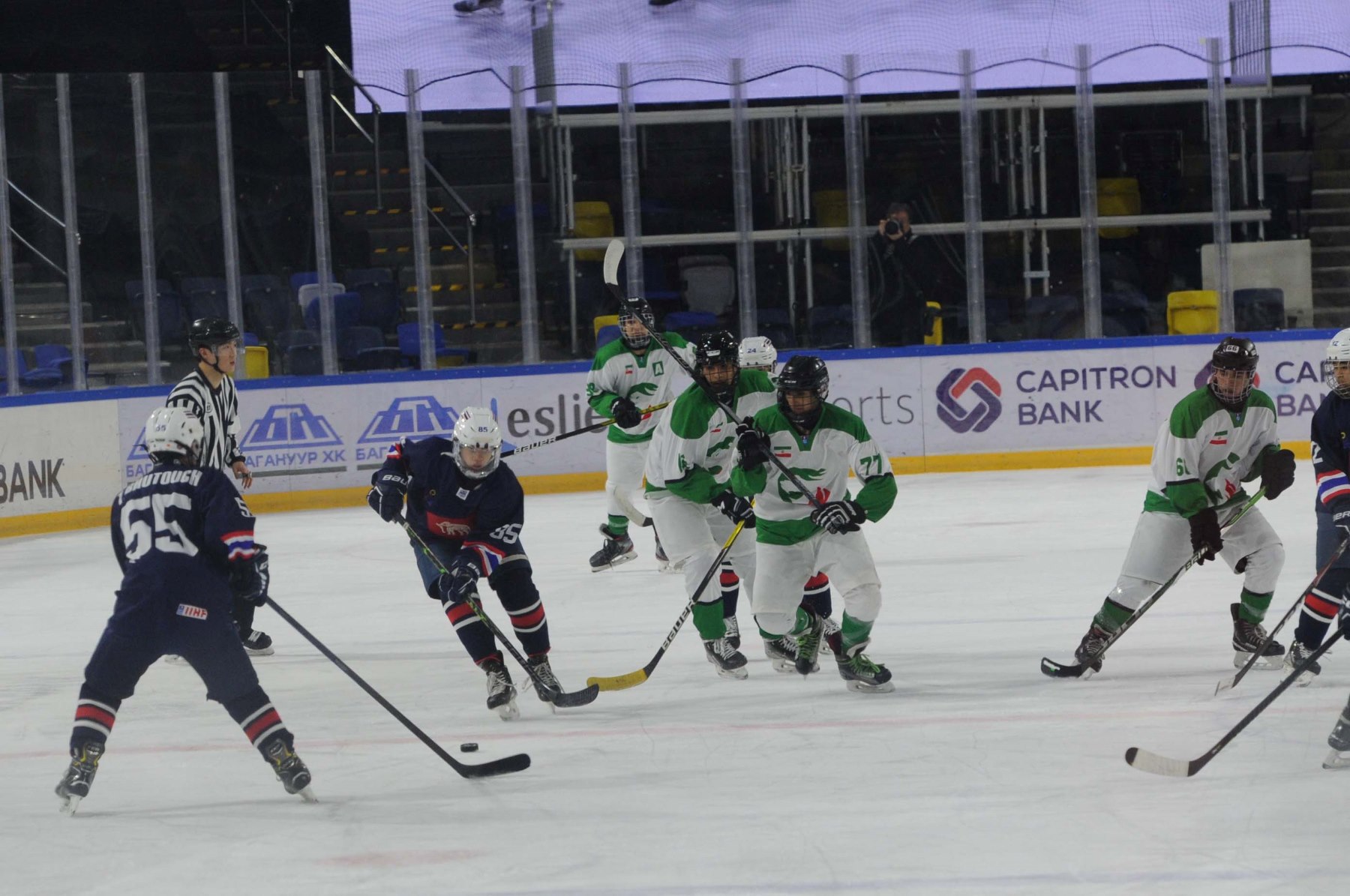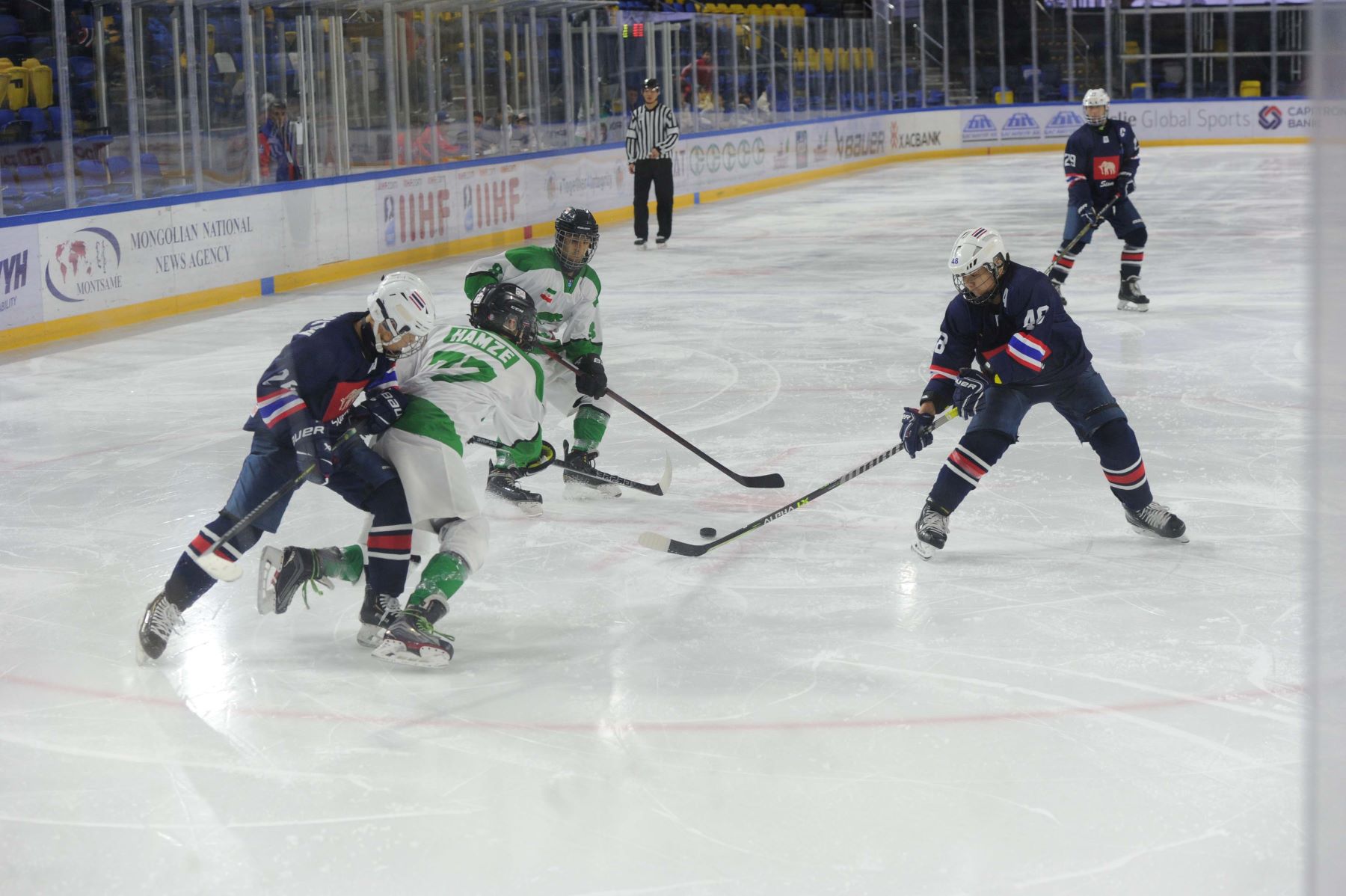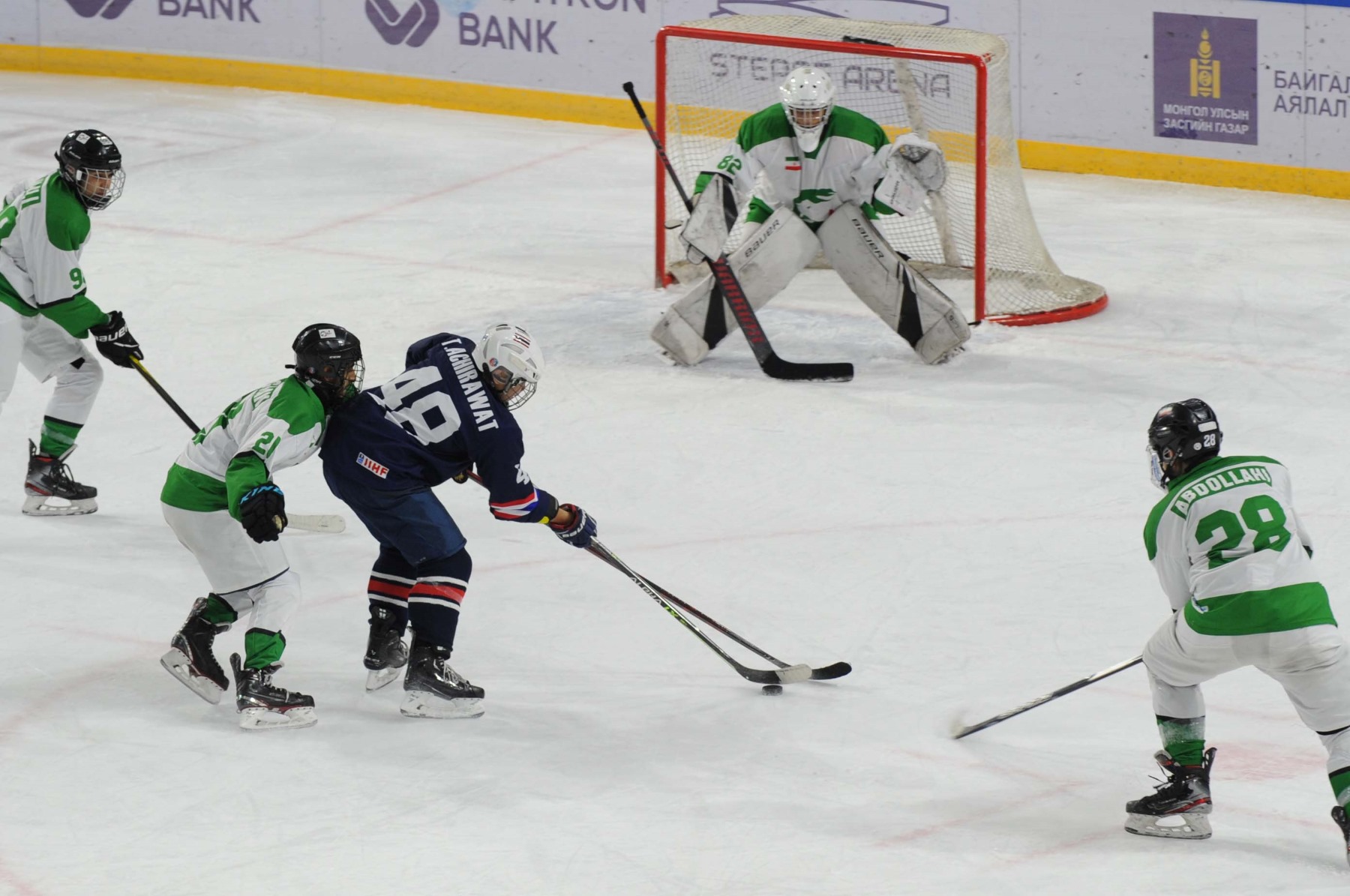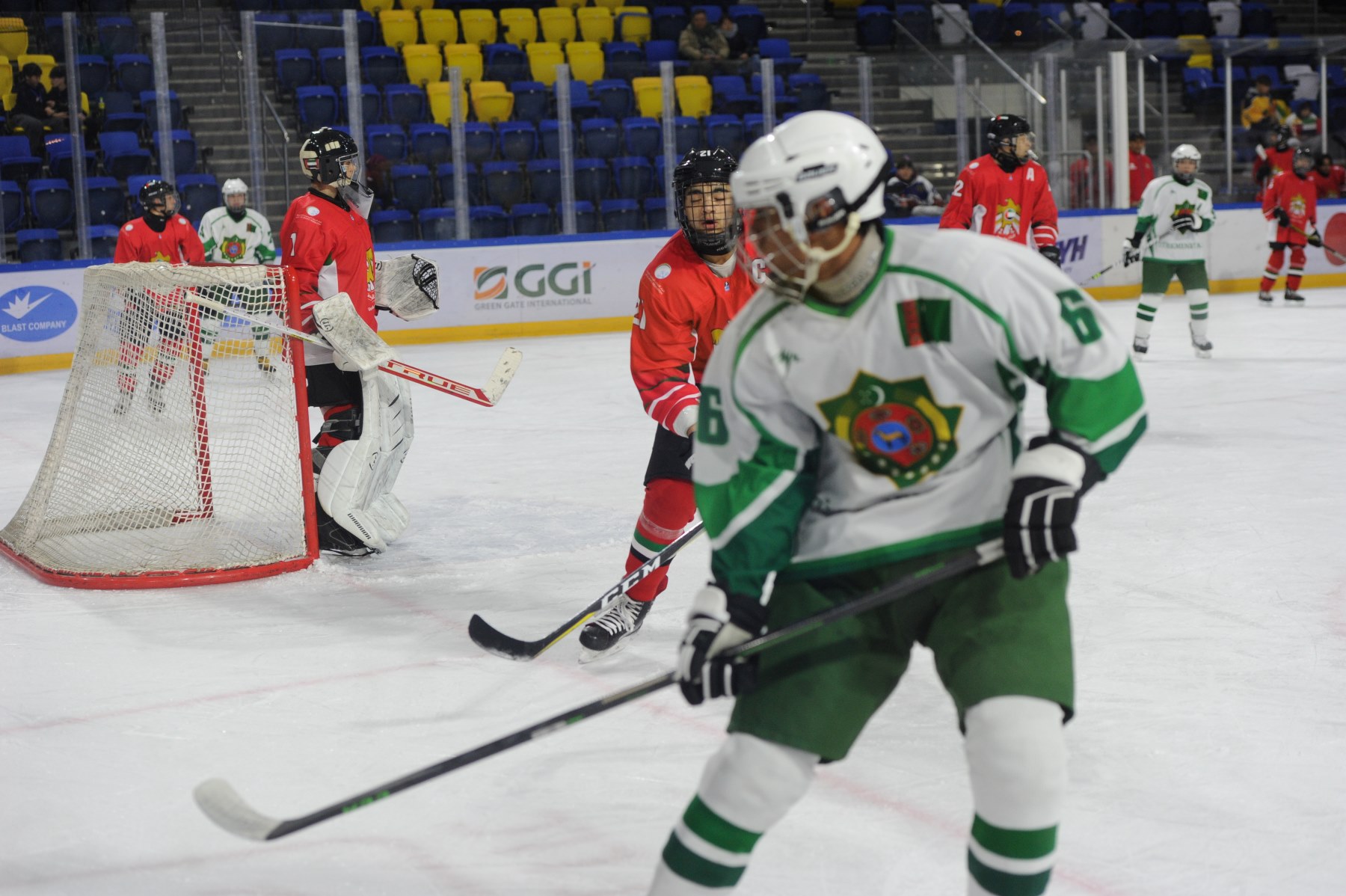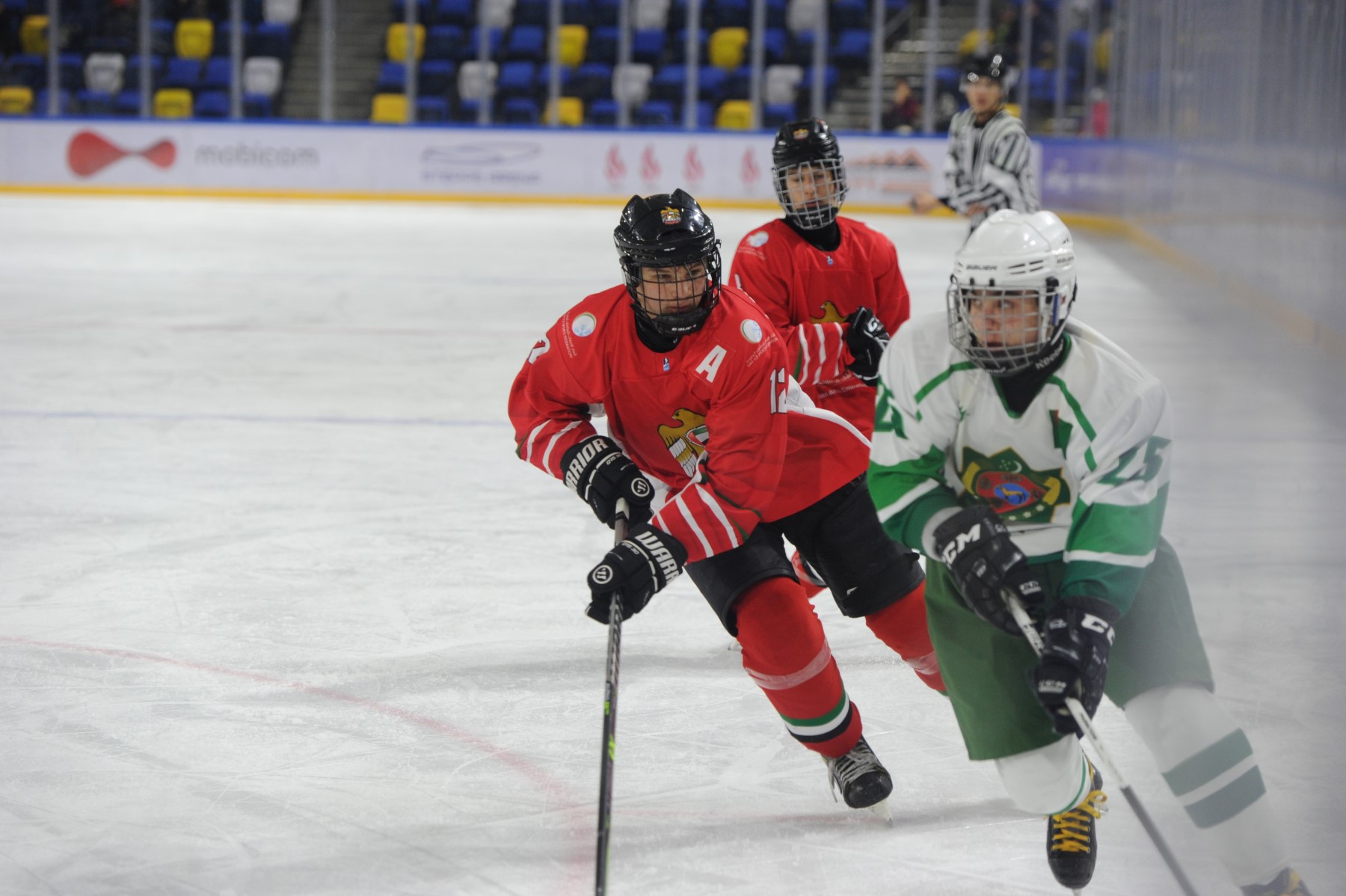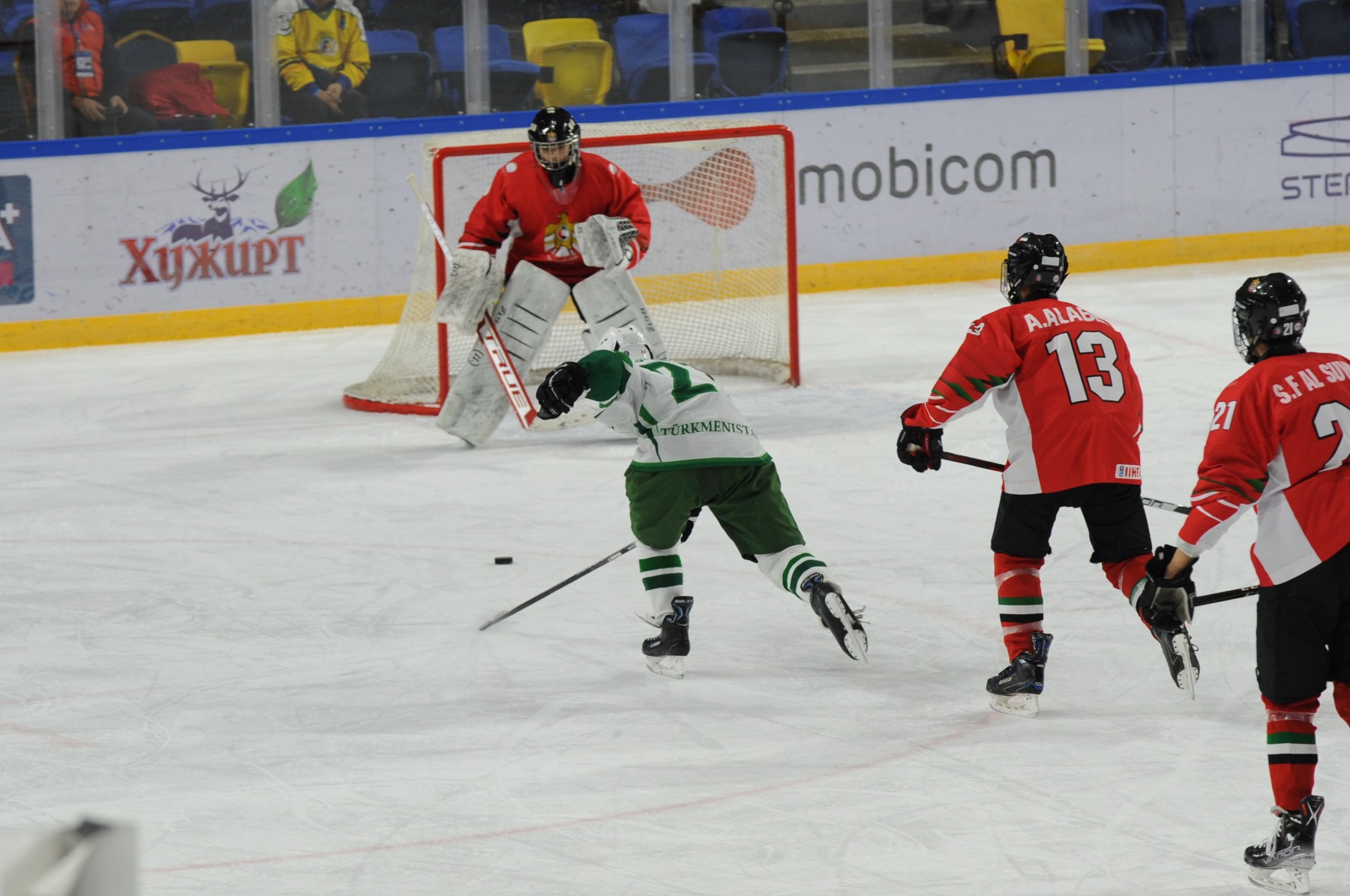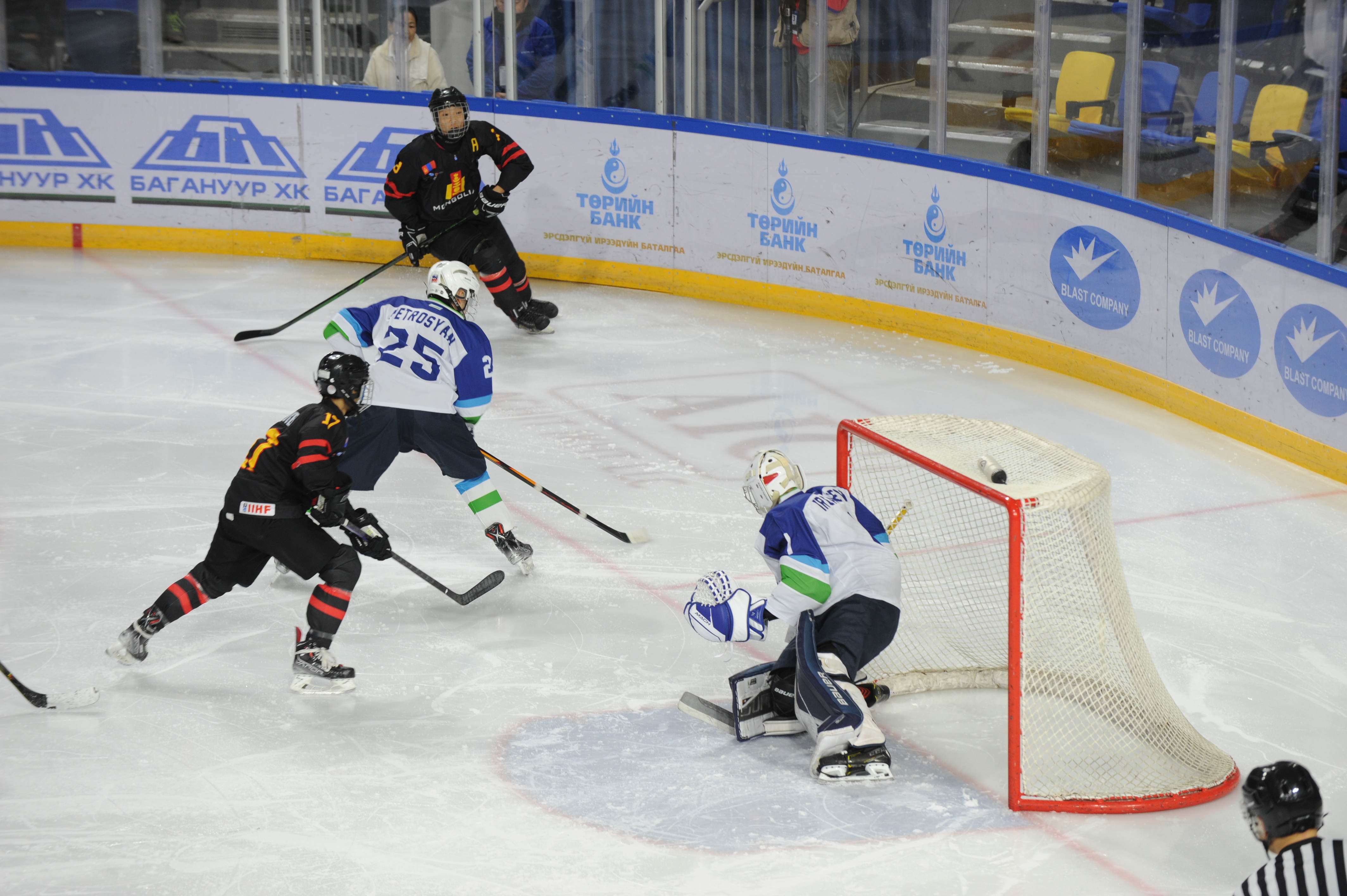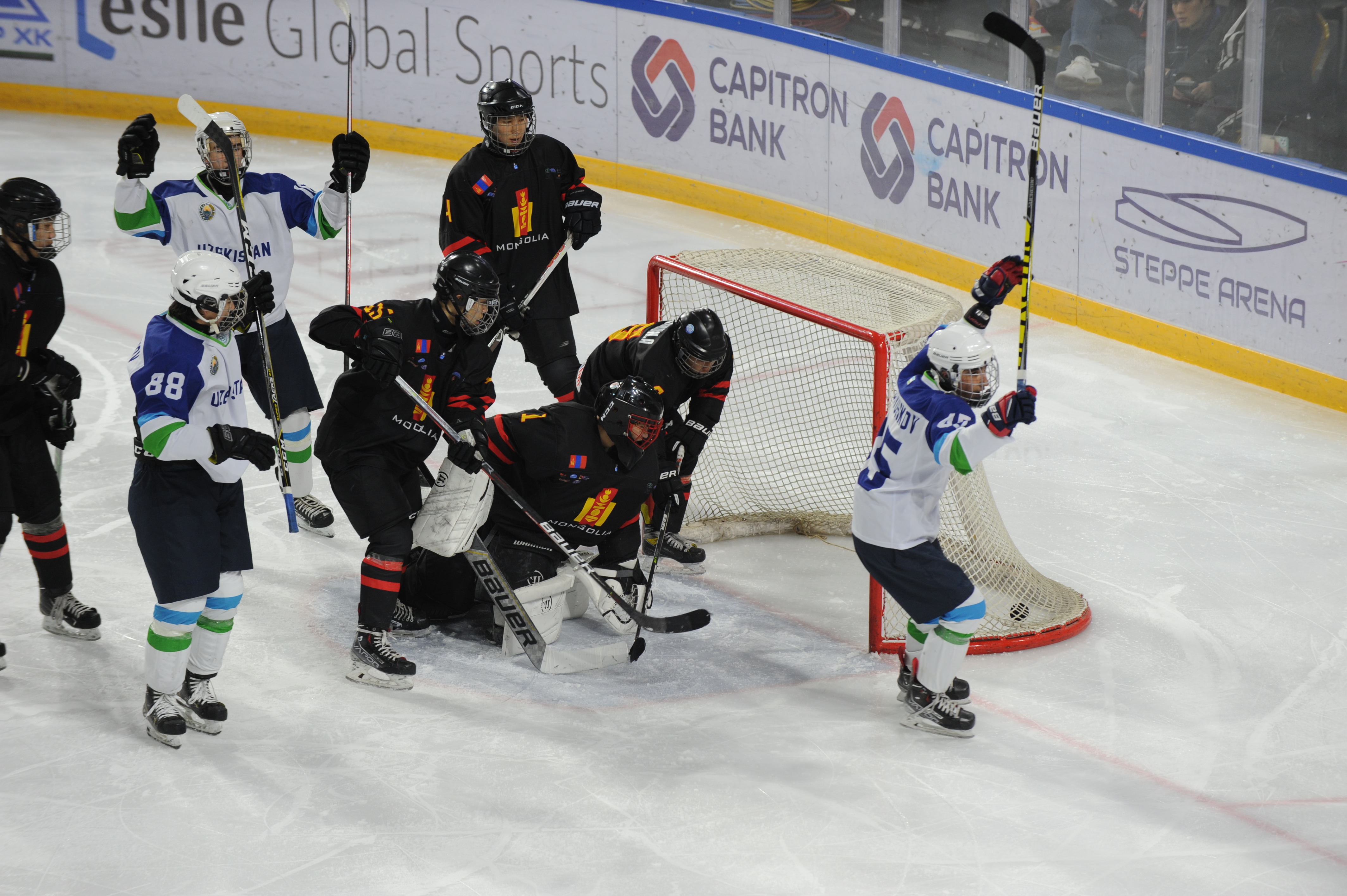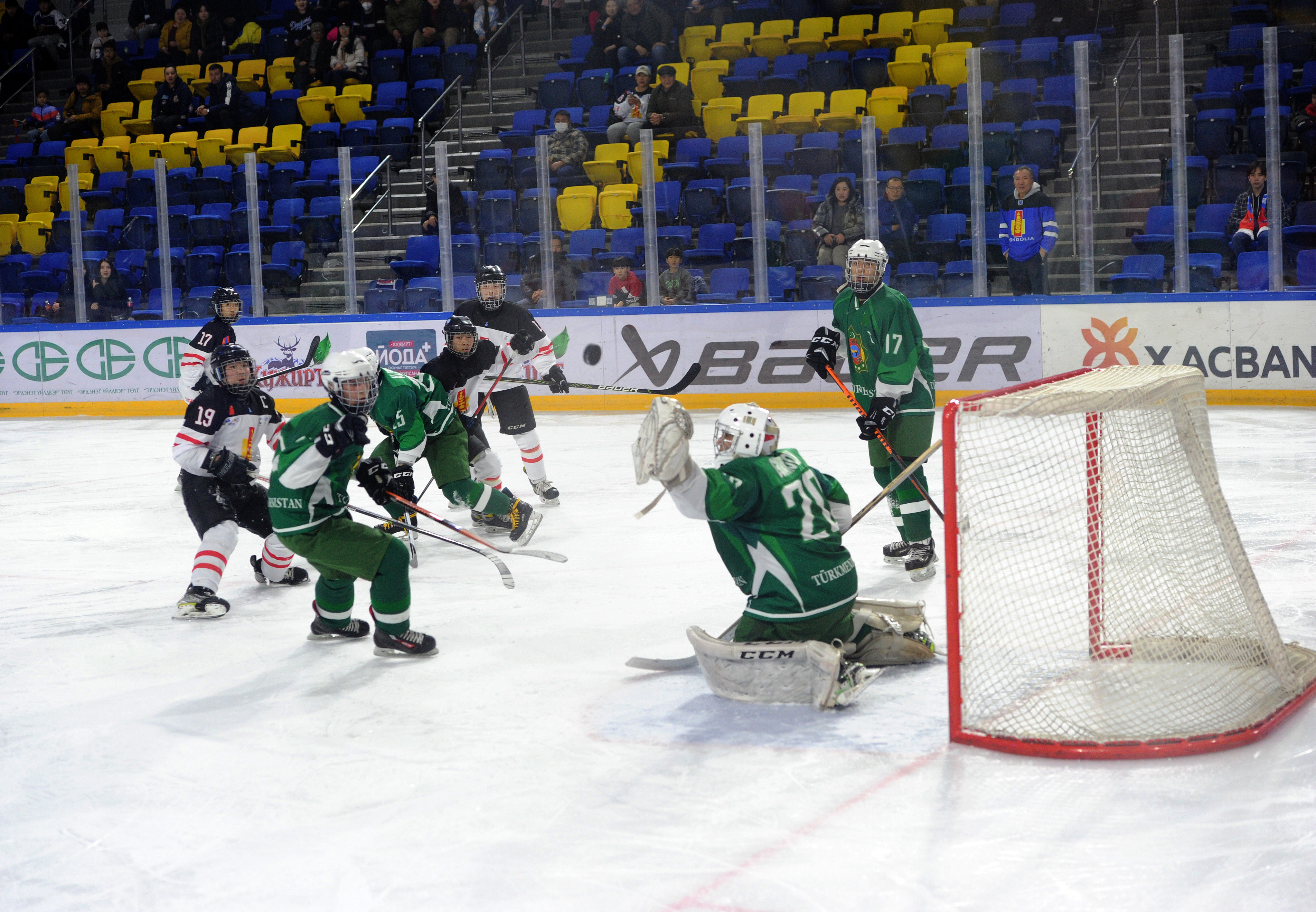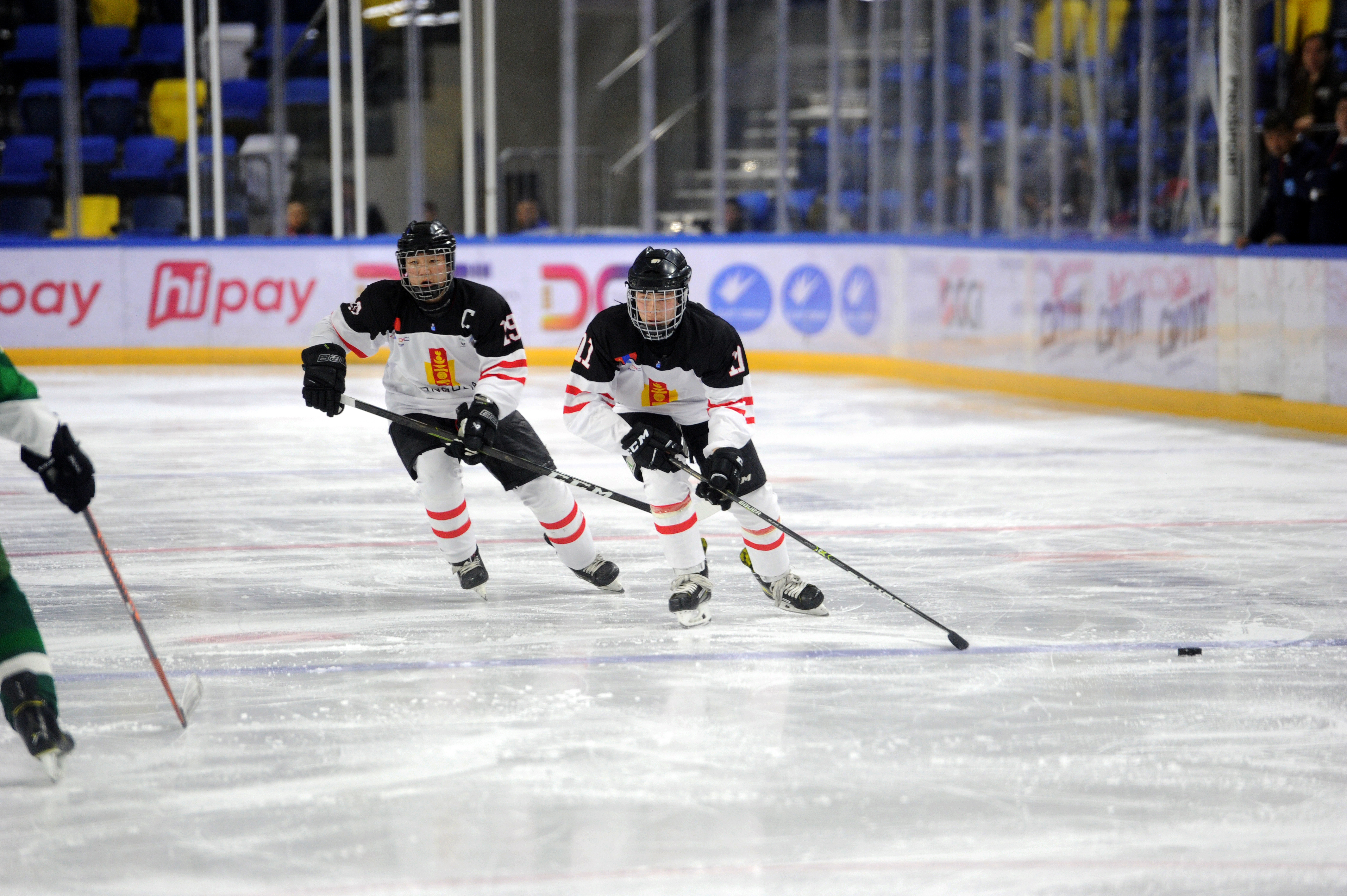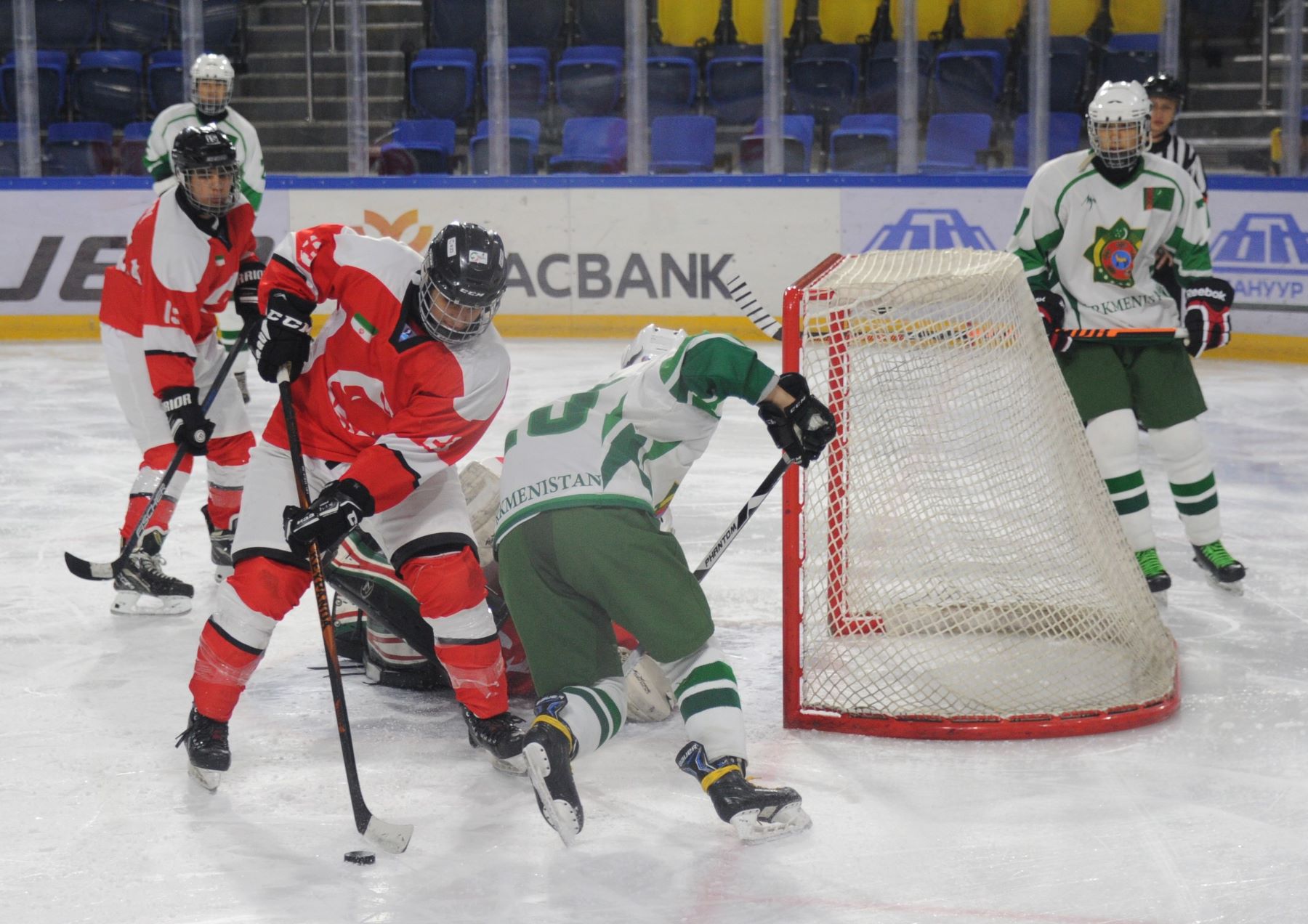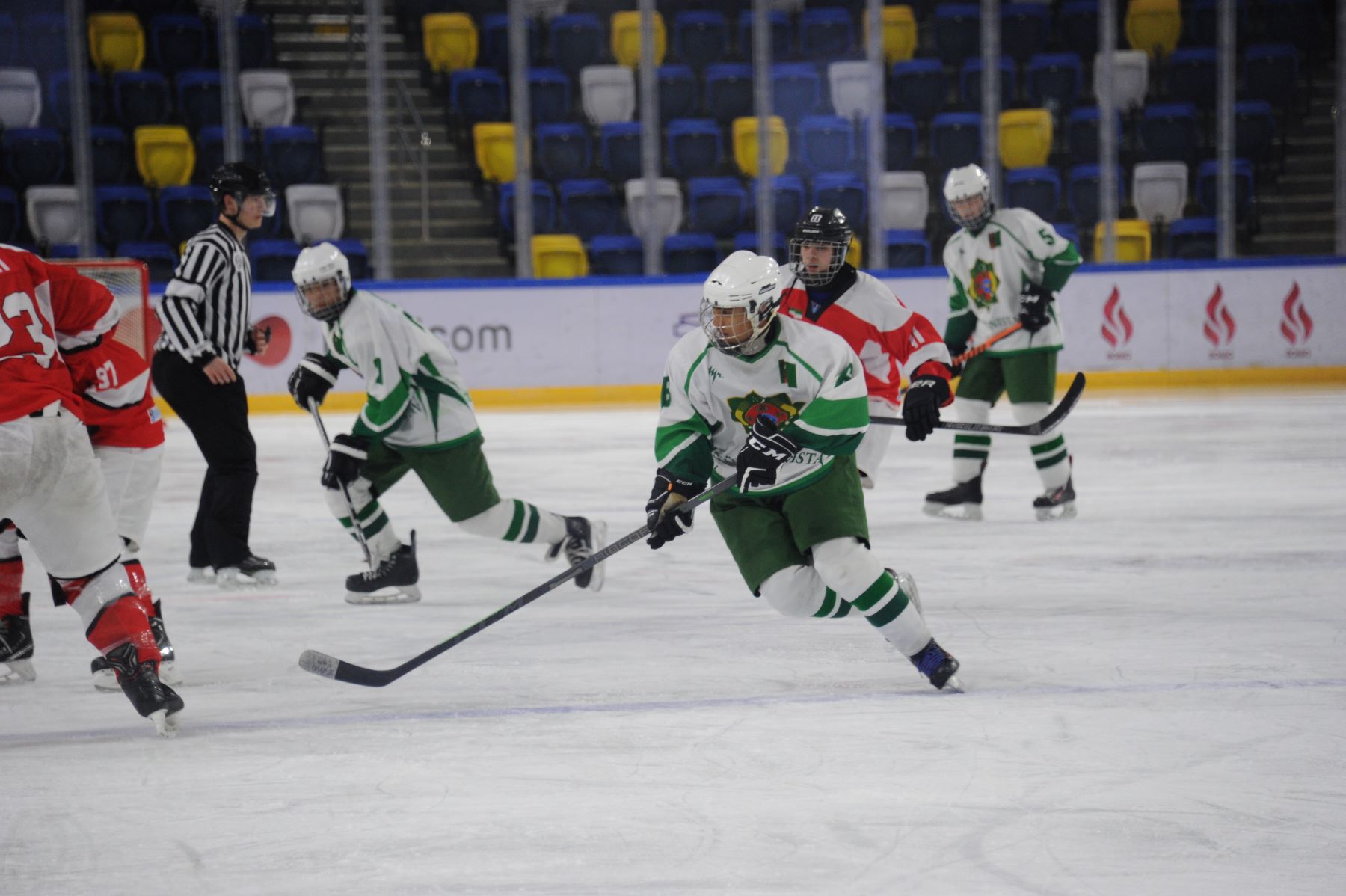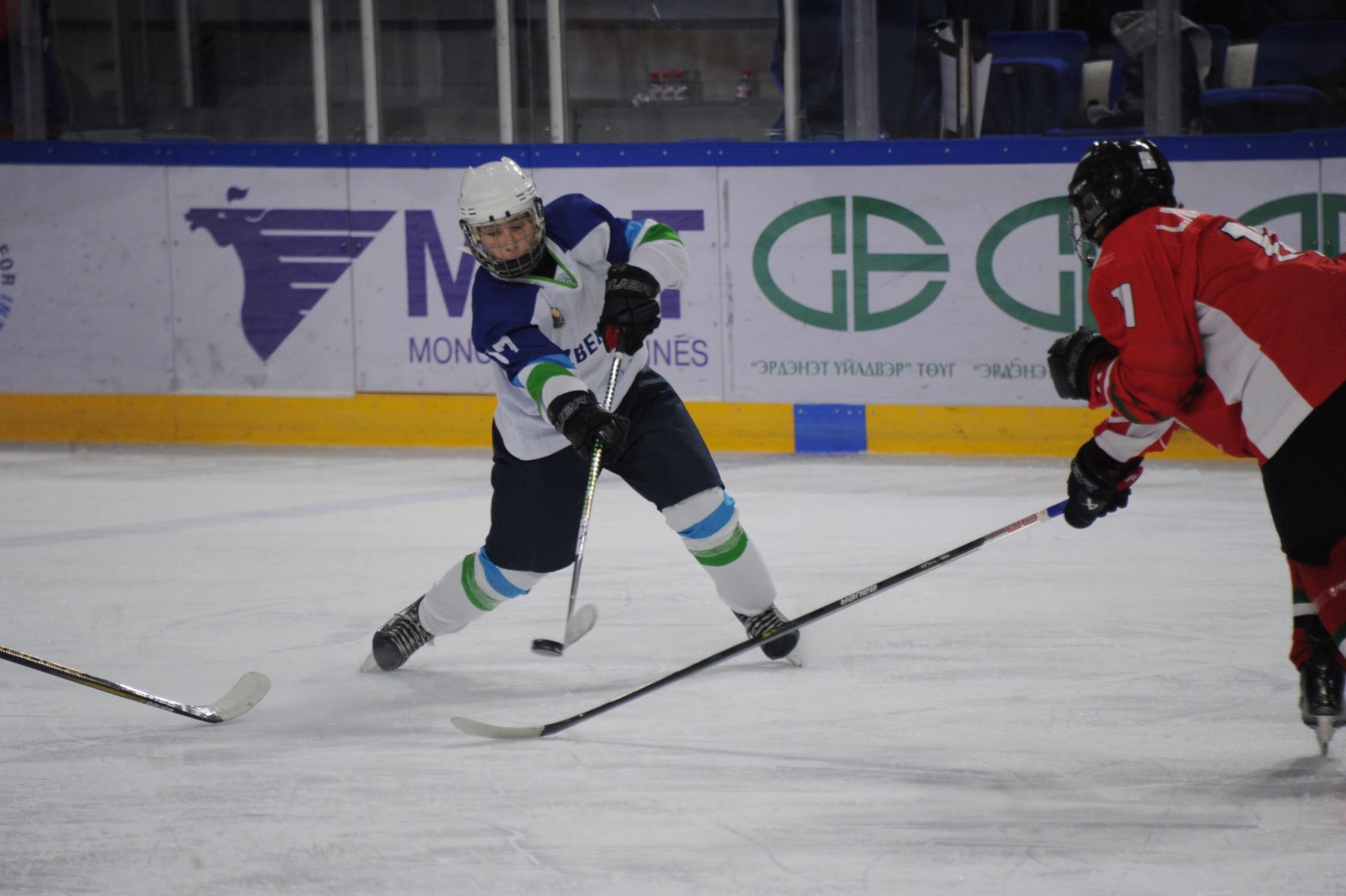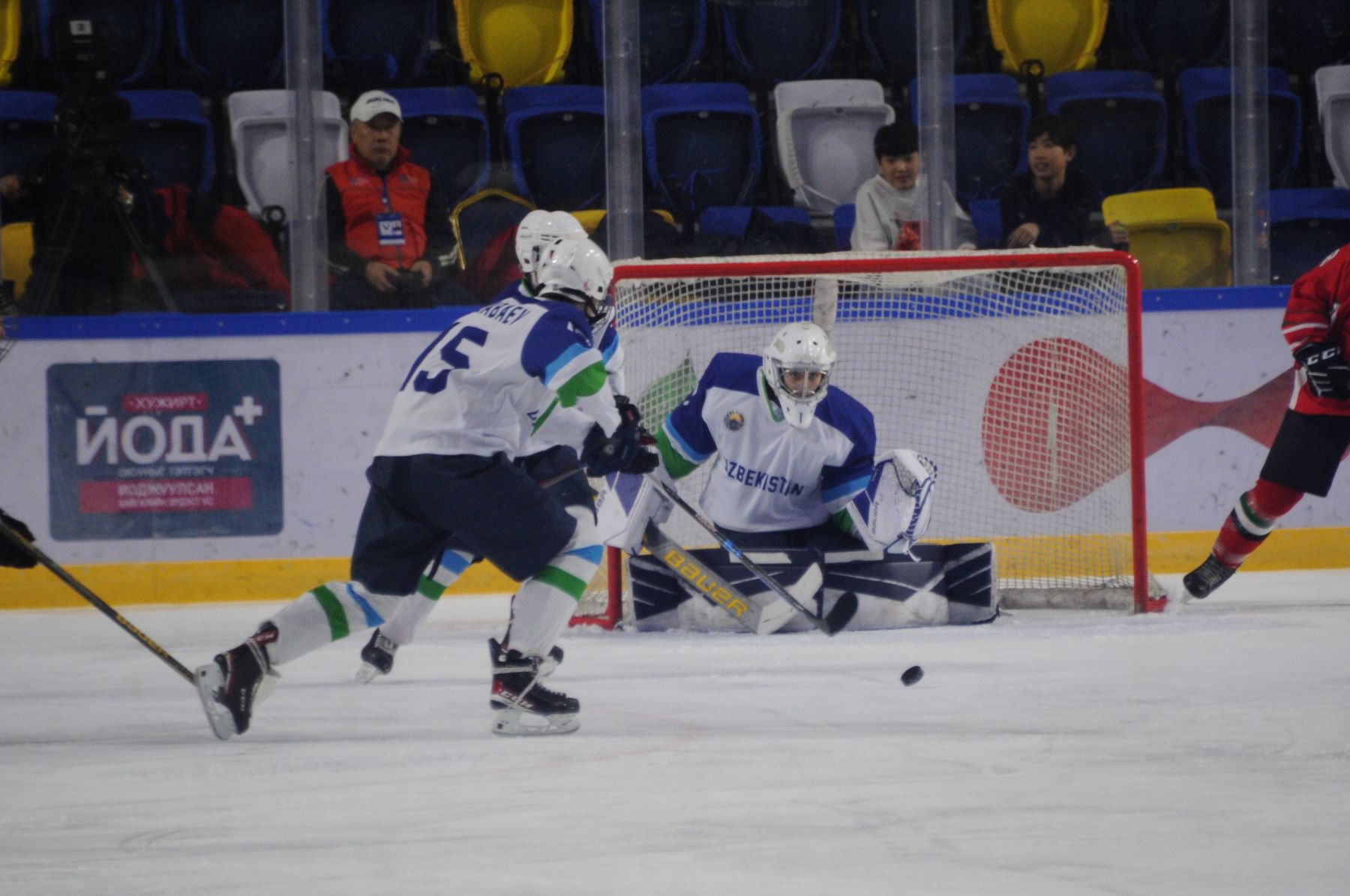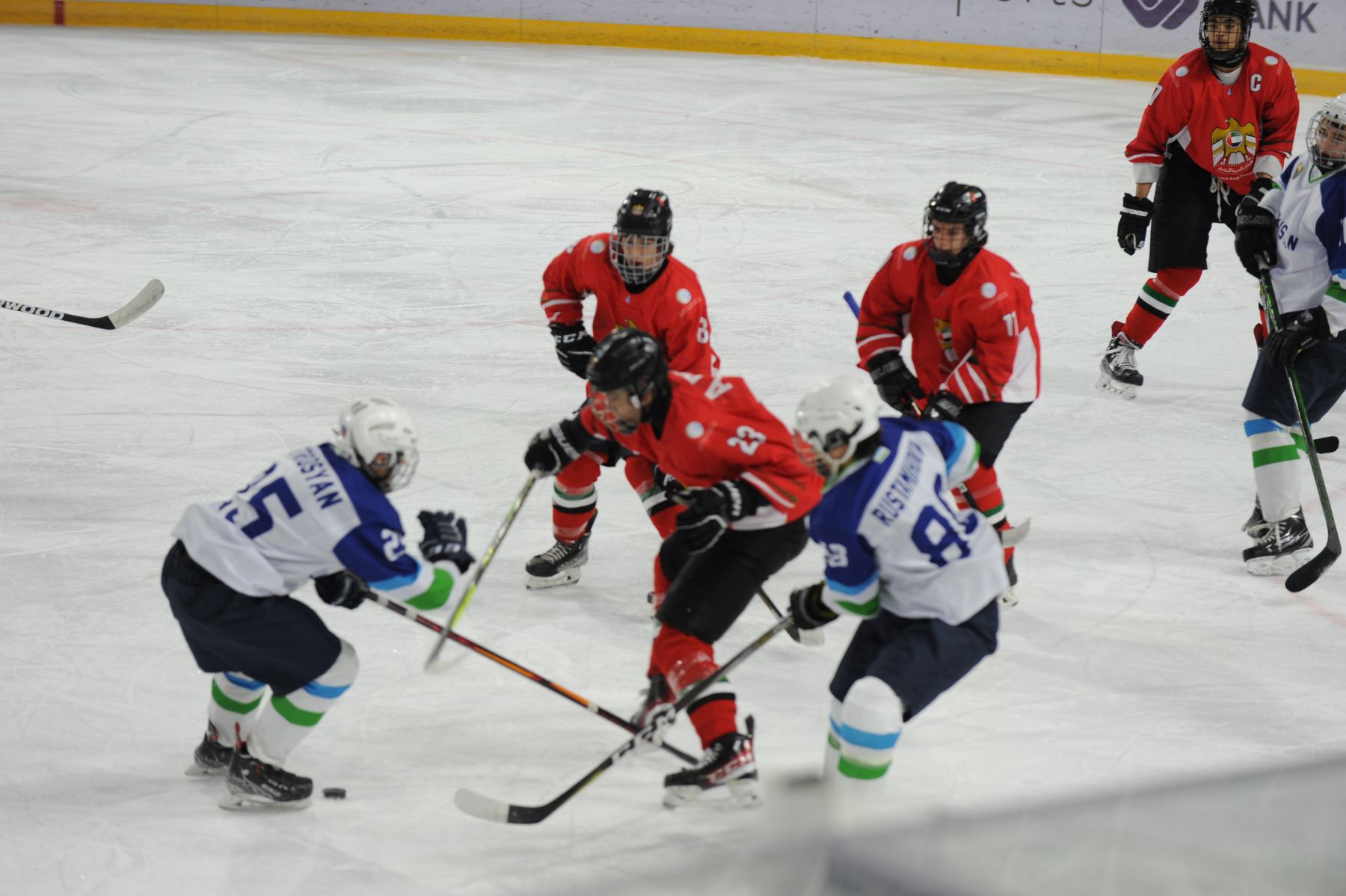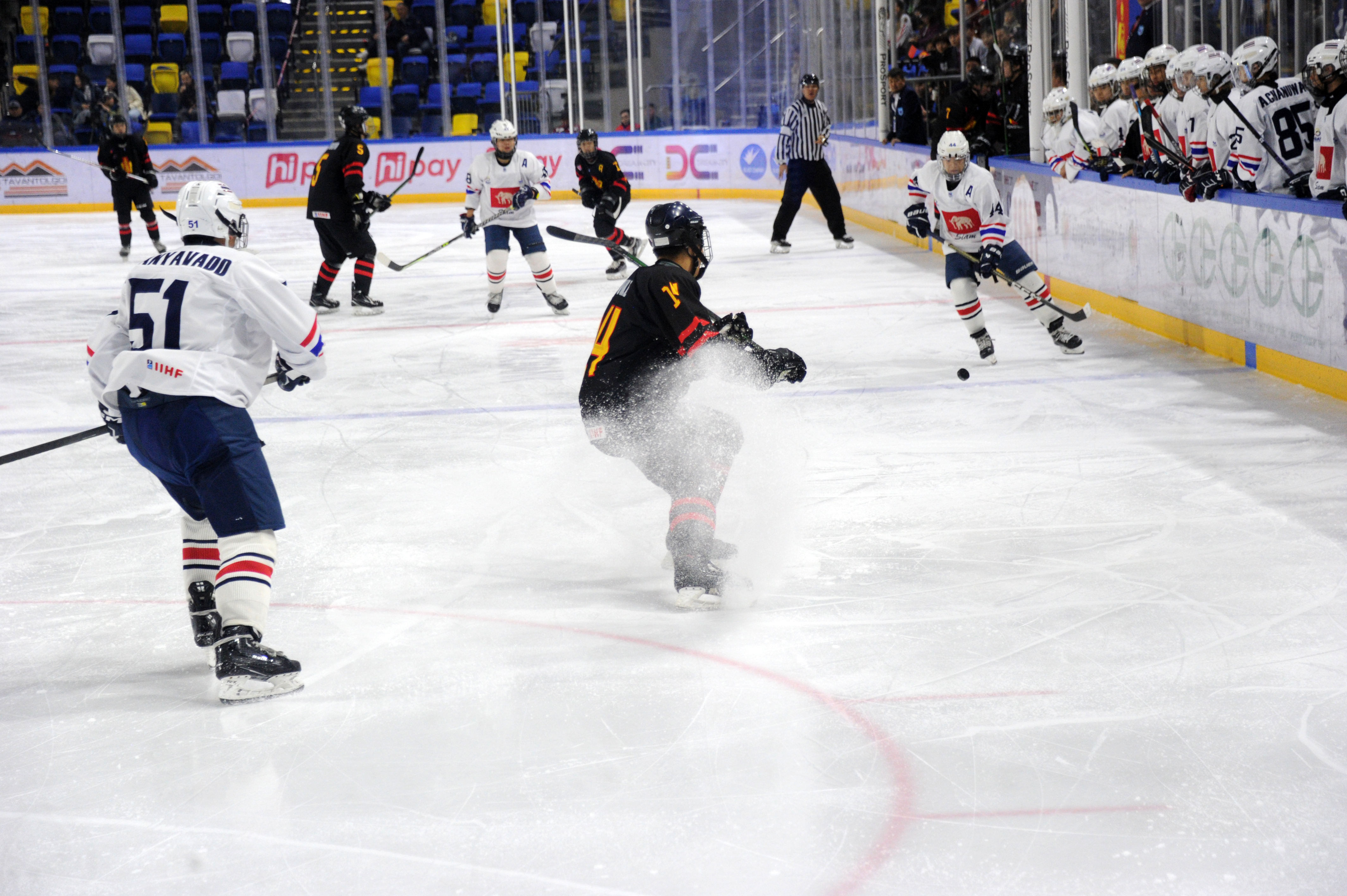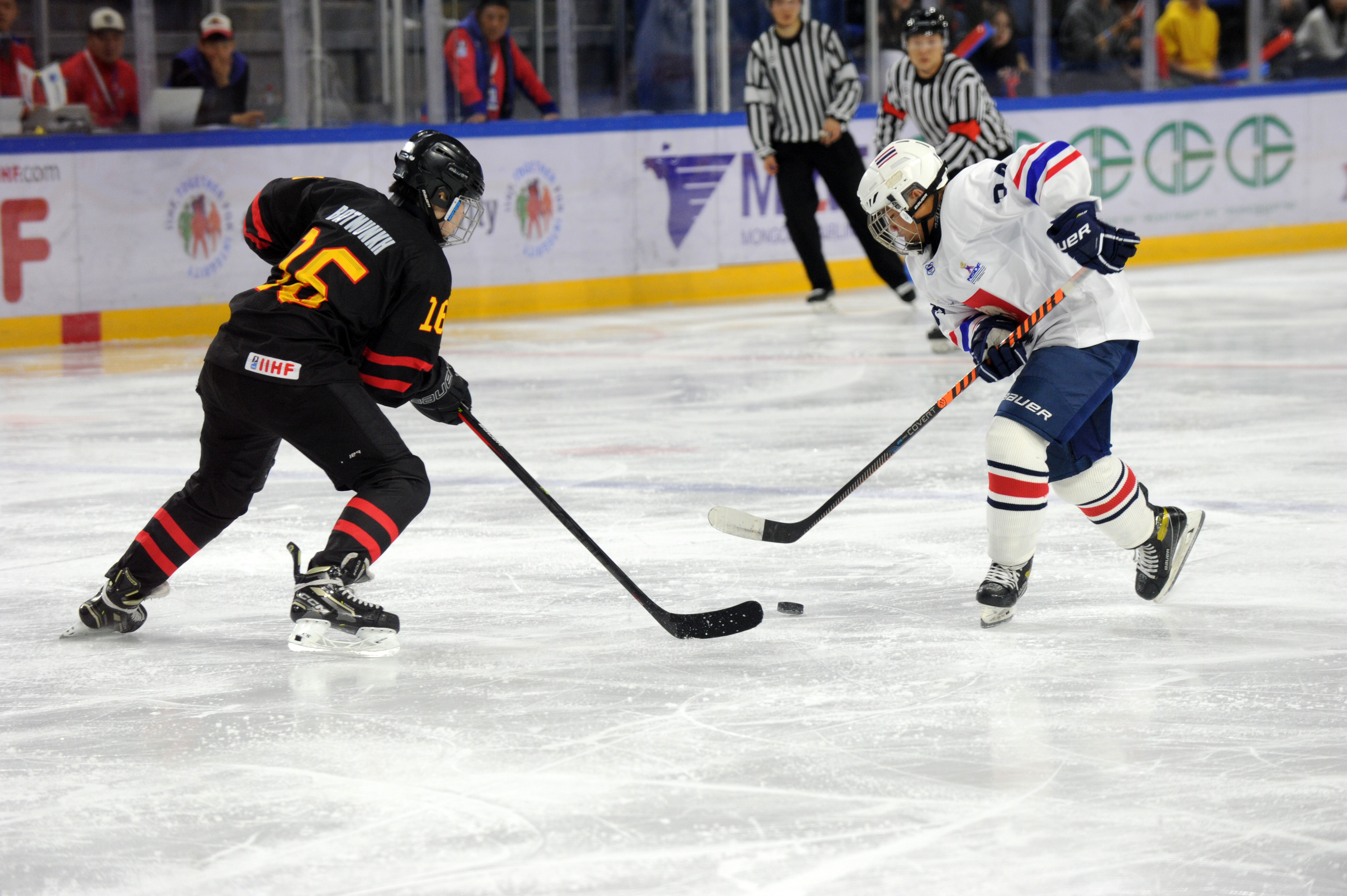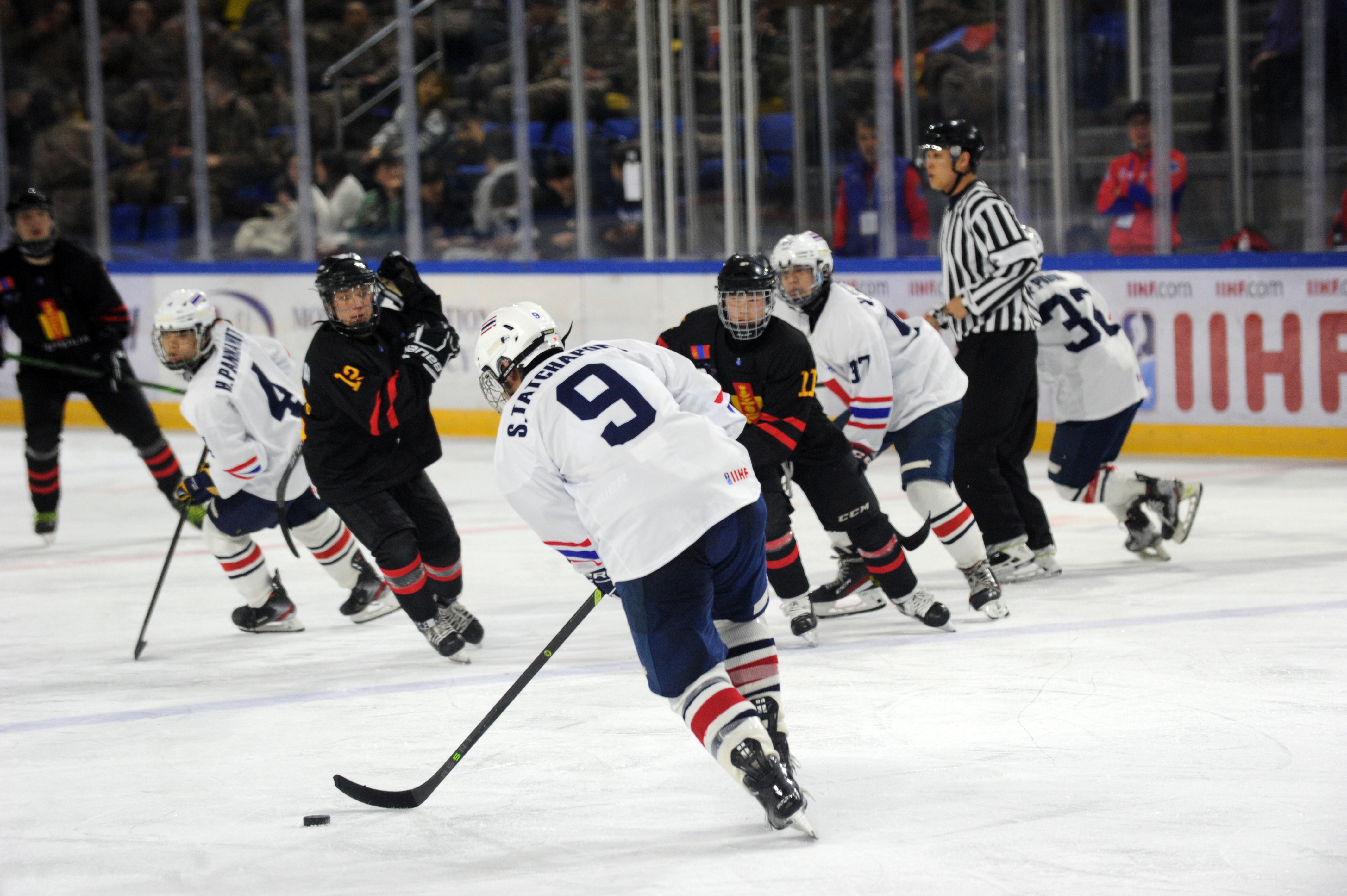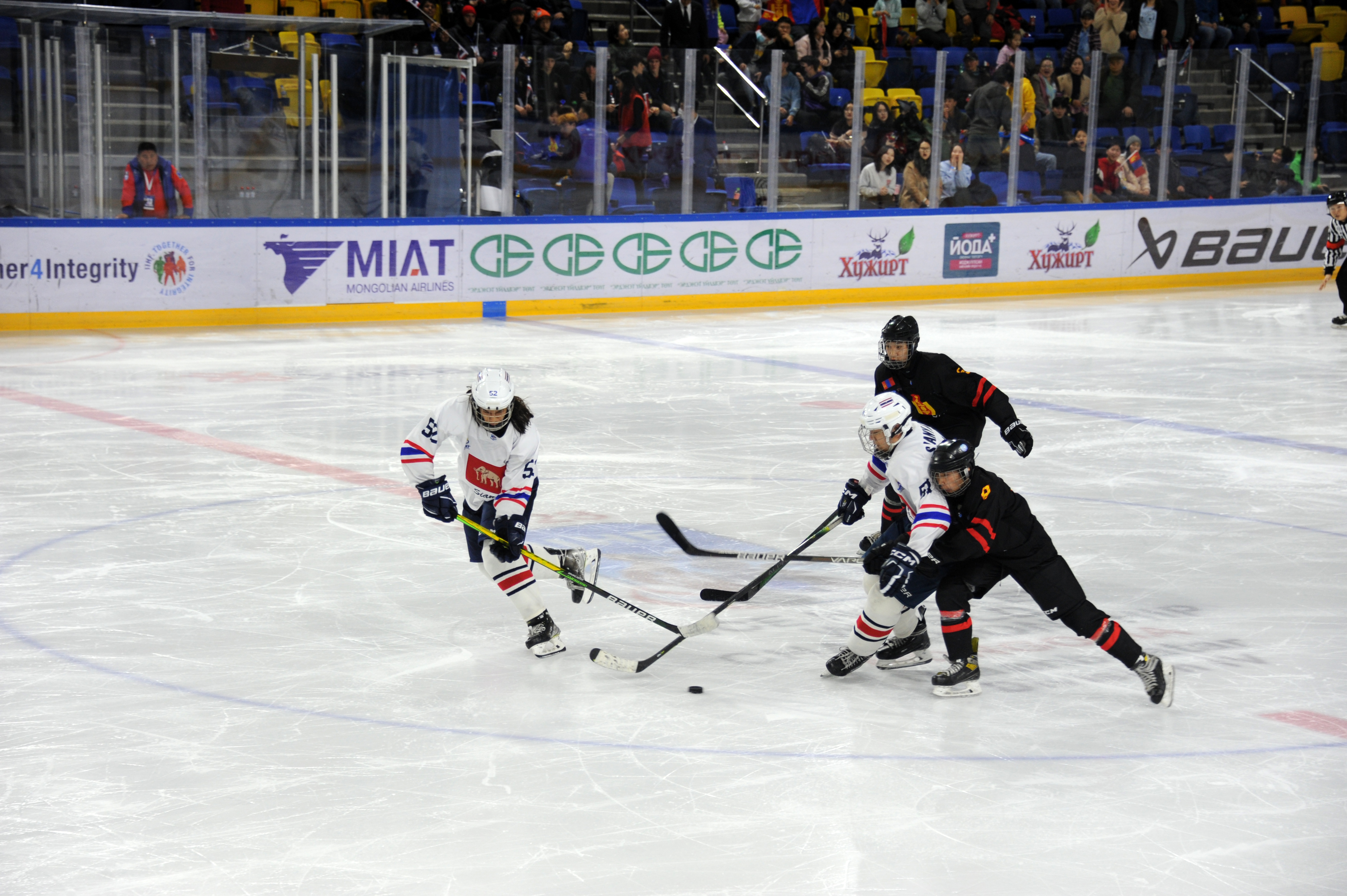The Uzbek players stand on the ice for the national anthem after a win at the 2023 IIHF Ice Hockey U18 Asia & Oceania Championship.
photo: J. Adilbish
Uzbekistan wasted no time in making an impact on IIHF play. The Central Asian country played its first ever official international tournament this week, and won gold with a game to spare. Facing off at the 2023 IIHF Ice Hockey U18 Asia & Oceania Championship in Ulaanbaatar, Mongolia, the Uzbek youngsters won all five games with a combined goal differential of 44-8.
Team Uzbekistan got off to a flying start with a 5-0 victory in its opening game against Turkmenistan. There were two goals apiece for Jasturbek Rustamkhonov and Albert Dadakhodjaev, while goalies Rustam Irgashev and Sergey Popov shared 15 saves to blank the opposition. That turned out to be crucial, with the Turkmens winning their four subsequent outings to take silver. The Uzbeks, meanwhile, rolled on with a crushing 14-1 success against Iran, a 7-4 win over host nation Mongolia and a 10-2 verdict against Thailand to seal first place with one game to spare.
For team captain and star forward Jasturbek Rustamkhonov, leading his team to gold in its first tournament was a special moment.
“It’s hard to put into words,” he said after the win over Thailand. “Our first time at a championship and right away, we’re already champions.
“I can’t wait for the final game and to get our hands on the cup.”
That final game brought an 8-1 victory over UAE, with Rustamkhonov getting a goal and three assists to take his personal tally to 26 (14+12) points for the tournament. That put him top of the tournament scoring chart by a big margin, ahead of Mongolia’s Chinzolboo Mishigsuren, who had 20 (9+11) points.
Rustamkhonov, unusually, has some experience of hockey in Europe. Earlier this season he played some games in Czechia with Kralove Pisek in U17 second division. The 15-year-old also played in Kazakhstan with Strizhi Almaty when he began his journey in the game. Now he’s back home in Tashkent, playing for Binokor in the national championship.
While Rustamkhonov picked up the plaudits for his scoring feats, he was quick to pay tribute to the work of his team-mates. “Everybody put a lot of effort into this,” he said. “We worked for this for a long time, we did everything to make sure we got here in good shape.
“We all worked hard, and that’s why we deserved to win.”
Alternate captain Temur Bagautdinov was the most productive defender at the tournament, compiling 9 (4+5) points in five games. He described the event as “the best tournament of my life”, rich reward for the hard work that got him there.
Team Uzbekistan was led by head coach Artur Fakhrutdinov. As a player, the 38-year-old Russia was part of the Ak Bars organisation for a time but spent the bulk of his career in Kazakhstan with Barys. Last season he coached a Tashkent U16 Select roster in the Kazakh U16 championship and here he was reunited with several of those players on international duty.
Now he’s hoping to move up a level with a group of players that will, largely, be available for U18 action once again next year.
“I hope that we can play in the World Championship next season,” he said. “We’re going to go home and keep preparing, we’ll keep working towards the next test.”
As for Ulaanbaatar? “This is the first time an Uzbek national team has competed at any kind of international hockey tournament,” he said. “We’re happy with how everything turned out for us, we got the job done as quickly as possible.
“I’m grateful to the guys, they all worked hard for this.”
Farkhutdinov’s Kazakh connections tell part of the story of Uzbek’s hockey’s rebirth. The game first came to Tashkent in the early 1970s, when Spartak Tashkent began playing in the lower levels of the Soviet league. However, in 1988 the team – known as Binokor at the time – was disbanded and Tashkent’s ice rink was demolished. In 2018, the game returned to the country after a 30-year gap with the foundation of the Uzbek Ice Hockey Federation. The following year saw Uzbekistan join the IIHF, while the first post-independence national championship was won by Semurg Tashkent.
Later in 2019, Humo Tashkent played its first season in the Russia’s second-tier VHL. The pandemic halted that season, and it wasn’t until this season that Humo returned to action in Kazakhstan’s Pro Ligasy. Meanwhile, several Uzbek youth and junior teams have also competed in Kazakhstan, including Farkhutdinov’s Tashkent U16s last season.
Team Uzbekistan got off to a flying start with a 5-0 victory in its opening game against Turkmenistan. There were two goals apiece for Jasturbek Rustamkhonov and Albert Dadakhodjaev, while goalies Rustam Irgashev and Sergey Popov shared 15 saves to blank the opposition. That turned out to be crucial, with the Turkmens winning their four subsequent outings to take silver. The Uzbeks, meanwhile, rolled on with a crushing 14-1 success against Iran, a 7-4 win over host nation Mongolia and a 10-2 verdict against Thailand to seal first place with one game to spare.
For team captain and star forward Jasturbek Rustamkhonov, leading his team to gold in its first tournament was a special moment.
“It’s hard to put into words,” he said after the win over Thailand. “Our first time at a championship and right away, we’re already champions.
“I can’t wait for the final game and to get our hands on the cup.”
That final game brought an 8-1 victory over UAE, with Rustamkhonov getting a goal and three assists to take his personal tally to 26 (14+12) points for the tournament. That put him top of the tournament scoring chart by a big margin, ahead of Mongolia’s Chinzolboo Mishigsuren, who had 20 (9+11) points.
Rustamkhonov, unusually, has some experience of hockey in Europe. Earlier this season he played some games in Czechia with Kralove Pisek in U17 second division. The 15-year-old also played in Kazakhstan with Strizhi Almaty when he began his journey in the game. Now he’s back home in Tashkent, playing for Binokor in the national championship.
While Rustamkhonov picked up the plaudits for his scoring feats, he was quick to pay tribute to the work of his team-mates. “Everybody put a lot of effort into this,” he said. “We worked for this for a long time, we did everything to make sure we got here in good shape.
“We all worked hard, and that’s why we deserved to win.”
Alternate captain Temur Bagautdinov was the most productive defender at the tournament, compiling 9 (4+5) points in five games. He described the event as “the best tournament of my life”, rich reward for the hard work that got him there.
Team Uzbekistan was led by head coach Artur Fakhrutdinov. As a player, the 38-year-old Russia was part of the Ak Bars organisation for a time but spent the bulk of his career in Kazakhstan with Barys. Last season he coached a Tashkent U16 Select roster in the Kazakh U16 championship and here he was reunited with several of those players on international duty.
Now he’s hoping to move up a level with a group of players that will, largely, be available for U18 action once again next year.
“I hope that we can play in the World Championship next season,” he said. “We’re going to go home and keep preparing, we’ll keep working towards the next test.”
As for Ulaanbaatar? “This is the first time an Uzbek national team has competed at any kind of international hockey tournament,” he said. “We’re happy with how everything turned out for us, we got the job done as quickly as possible.
“I’m grateful to the guys, they all worked hard for this.”
Farkhutdinov’s Kazakh connections tell part of the story of Uzbek’s hockey’s rebirth. The game first came to Tashkent in the early 1970s, when Spartak Tashkent began playing in the lower levels of the Soviet league. However, in 1988 the team – known as Binokor at the time – was disbanded and Tashkent’s ice rink was demolished. In 2018, the game returned to the country after a 30-year gap with the foundation of the Uzbek Ice Hockey Federation. The following year saw Uzbekistan join the IIHF, while the first post-independence national championship was won by Semurg Tashkent.
Later in 2019, Humo Tashkent played its first season in the Russia’s second-tier VHL. The pandemic halted that season, and it wasn’t until this season that Humo returned to action in Kazakhstan’s Pro Ligasy. Meanwhile, several Uzbek youth and junior teams have also competed in Kazakhstan, including Farkhutdinov’s Tashkent U16s last season.
Mongolia welcomes the world
The tournament was also a big deal for Mongolia, which was hosting an IIHF event for the first time. The newly-built Steppe Arena in the capital, Ulaanbaatar, can hold 2,600 spectators and is the first indoor hockey arena in Mongolia’s history. The multi-sport facility will also stage this year’s men’s Division World Championship, with Mongolia taking on Indonesia, Kuwait and the Philippines.Uzbek head coach Artur Fakhrutdinov enjoyed the experience of playing in front of a lively crowd in Ulaanbaatar. “There was a great atmosphere throughout the tournament,” he said. “It was good to see fans coming along to watch our games. To be honest, we didn’t expect so many spectators. It’s always more fun to play with a crowd.”
The host nation also had plenty to enjoy on the ice after picking up bronze medals. Going into the final game against Thailand, the Mongolians had the luxury of knowing that even a three-goal loss would not see them drop below third place in the standings.
However, there were some anxious moments in store. The Thais went up 4-1 in the 33rd minute and suddenly the bronze medals were up for grabs. A power play goal late in the second period calmed home nerves, and the third period saw Mongolia rally for a 6-4 victory. Mishigsuren scored a hat-trick in that final frame.
Outside of the medals, UAE came fourth with six points ahead of Thailand, whose only victory was against Iran. The Iranians found this tournament tough, scoring just four goals as they lost all five games.
2023 IIHF Ice Hockey U18 Asia and Oceania Championship
OF








